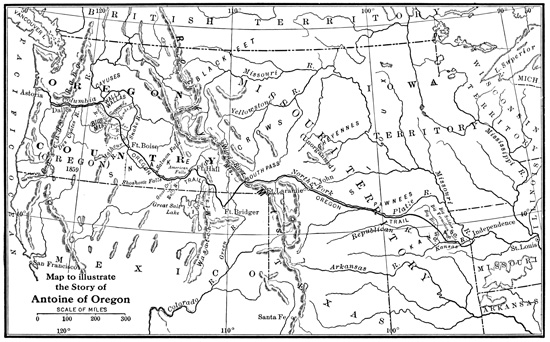
Map to illustrate the Story of Antoine of Oregon
Title: Antoine of Oregon: A Story of the Oregon Trail
Author: James Otis
Release date: October 5, 2013 [eBook #43897]
Language: English
Credits: Produced by Melissa McDaniel and the Online Distributed
Proofreading Team at http://www.pgdp.net (This file was
produced from images generously made available by The
Internet Archive)
Transcriber's Note:
Obvious typographical errors have been corrected. Inconsistent spelling and hyphenation in the original document have been preserved.

Map to illustrate the Story of Antoine of Oregon
A Story of the Oregon Trail
BY
JAMES OTIS

NEW YORK -:- CINCINNATI -:- CHICAGO
AMERICAN BOOK COMPANY
Copyright, 1912, by
JAMES OTIS KALER.
Copyright, 1912, in Great Britain.
ANTOINE OF OREGON.
W. P. I
The author of this series of stories for children has endeavored simply to show why and how the descendants of the early colonists fought their way through the wilderness in search of new homes. The several narratives deal with the struggles of those adventurous people who forced their way westward, ever westward, whether in hope of gain or in answer to "the call of the wild," and who, in so doing, wrote their names with their blood across this country of ours from the Ohio to the Columbia.
To excite in the hearts of the young people of this land a desire to know more regarding the building up of this great nation, and at the same time to entertain in such a manner as may stimulate to noble deeds, is the real aim of these stories. In them there is nothing of romance, but only a careful, truthful record of the part played by children in the great battles with those forces, human as well as natural, which, for so long a time, held a vast 4 portion of this broad land against the advance of home seekers.
With the knowledge of what has been done by our own people in our own land, surely there is no reason why one should resort to fiction in order to depict scenes of heroism, daring, and sublime disregard of suffering in nearly every form.
JAMES OTIS.
| PAGE | |
| The Fur Traders | 9 |
| Why I am not a Fur Trader | 11 |
| Striving to Plan for the Future | 13 |
| An Inquisitive Stranger | 15 |
| An Unexpected Proposition | 16 |
| I set Out as a Guide | 18 |
| John Mitchell's Outfit | 20 |
| Making the Bargain | 23 |
| We Leave St. Louis | 25 |
| The Hardships to be Encountered | 26 |
| The Camp at Independence | 28 |
| A Frontier Town | 30 |
| The Start from Independence | 33 |
| Careless Travelers | 35 |
| Overrun by Wild Horses | 38 |
| Searching for the Live Stock | 40 |
| Abandoning the Missing Animals | 42 |
| Meeting with Other Emigrants | 43 |
| A Tempest | 46 |
| Facing the Indians | 49 |
| Teaching the Pawnees a Lesson | 51 |
| The Pawnee Village | 53 |
| A Bold Demand | 54 6 |
| I Gain Credit as a Guide | 56 |
| A Difficult Crossing | 58 |
| Wash Day | 60 |
| Indian Pictures | 62 |
| A Plague of Wood Ticks | 64 |
| Another Tempest | 66 |
| The Cattle Stampeded Again | 68 |
| Difficult Traveling | 69 |
| Colonel Kearny's Dragoons | 71 |
| Disagreeable Visitors | 73 |
| Driving away the Indians | 75 |
| Turkey Hunting | 76 |
| Eager Hunters | 77 |
| Antelope Country | 79 |
| Shooting Antelopes | 81 |
| A Pawnee Visitor | 83 |
| The Pawnees try to Frighten Us | 85 |
| Defending Ourselves | 87 |
| Scarcity of Fuel, and Discomfort | 89 |
| Lame Oxen | 91 |
| An Army of Emigrants | 92 |
| The Buffalo Country | 95 |
| Hunting Buffaloes | 97 |
| My Mother's Advice | 99 |
| Ash Hollow Post Office | 100 |
| New Comrades | 102 |
| Fort Laramie | 103 |
| A Sioux Encampment | 106 7 |
| Indians on the March | 107 |
| The Fourth of July | 109 |
| Multitudes of Buffaloes | 111 |
| We Meet Colonel Kearny Again | 113 |
| Across the Divide | 115 |
| Fort Bridger | 117 |
| Trading at Fort Hall | 122 |
| Thievish Snakes | 123 |
| The Hot Springs | 124 |
| The Falls of the Snake River | 126 |
| Signs of the Indians | 128 |
| Beset with Danger | 129 |
| Hunger and Thirst | 131 |
| Nearly Exhausted | 133 |
| Arrival at Fort Boise | 135 |
| On the Trail Once More | 137 |
| Cayuse Indians | 139 |
| The Columbia River | 140 |
| An Indian Ferry | 141 |
| The Dalles of the Columbia | 143 |
| Our Live Stock | 144 |
| My Work as Guide Ended | 145 |
| I Become a Farmer | 146 |
ANTOINE OF OREGON
There is ever much pride in my heart when I hear it said that all the trails leading from the Missouri River into the Great West were pointed out to the white people by fur buyers, for my father was well known, and in a friendly way, as one of the most successful of the free traders who had their headquarters at St. Louis.
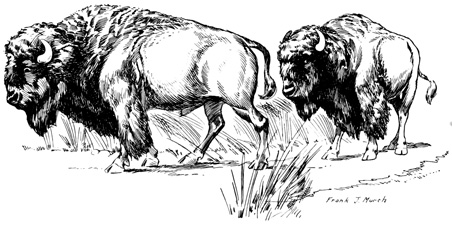
It is not for me to say, nor for you to believe, that the fur traders were really the first to travel over these trails, for, as a matter of fact, they were marked out 10 in the early days by the countless numbers of buffaloes, deer, and other animals that always took the most direct road from their feeding places to where water could be found.
Then came the Indians, seeking a trail from one part of the country to another, and they followed in the footsteps of the animals, knowing full well that thereby they would not lack for water, the one thing needful to those who go to and fro in the wilderness.
Thus it was that the animals and the Indians combined to mark out the most direct roads that could be made, with due regard to the bodily needs of those who traveled from one part of the Great West to another.
As the traders in furs journeyed from tribe to tribe of the Indians, or sought the most favored places for trapping, they learned how white men could go westward from the Missouri River to the Pacific Ocean without fear of dying from hunger or thirst.
My father, Pierre Laclede, was, as I have said, a free trader, which means that he went out into the wilderness with his crew of boatmen and trappers, free from any bargains or duties to the great fur trading companies, such as the Hudson's Bay, the Northwest, and the X. Y.
There were regular battles fought between the hunters and trappers of these great companies in the olden 11 days, when St. Louis was under Spanish rule and had become a famous gathering place for the fur traders.
There were many like my father, who, hiring men to help them, carried into the wilderness goods to be exchanged with the Indians for furs, and, failing in this, set about trapping fur-bearing animals throughout the winter season.
Wonderful sport these same traders had, as I know full well, having been more than once with my father over that trail leading from the Missouri River to the Oregon country.
Then there was the home-coming to St. Louis, when every man forgot the days on which he had been cold or hungry, and no longer heeded the half-healed wounds received in Indian attacks, when he had been forced to defend with his life the furs he had gathered.
Once in St. Louis, what rare times of feasting and making merry, while the furs were being shipped to New Orleans, or bartered to the big companies that were ever on the watch for the return of the free traders!
I, Antoine Laclede, would have followed in the footsteps of my father, becoming myself a free trader after the treacherous Blackfeet Indians killed him, had it not been that my mother, with her arms around my neck, pleaded that I remain at home with her. 12
Therefore, instead of carrying on my father's business as a lad of fifteen should have done, I strove to content myself at St. Louis, to the pleasure of my dear mother.
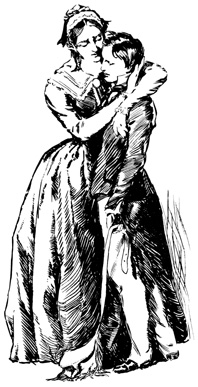
However much affection there might be between us, it remained that we must be supplied with food, and that my mother should have the things necessary for her comfort.
But if I did not take up my father's business after he had lost, with his life, the store of furs which he had been eight months in gathering, as well as what remained of the goods he had carried into the wilderness for trading, then how could I rightly fill the position as head of the family, when all I had in this world were my two hands and the desire to make my mother happy?
We lived on a street near the old cathedral, and it may be that our small home was not the most pleasing to look upon of all the houses in St. Louis; but in it I was born. My father had built it, paying for 13 every timber with furs he had gathered at risk of his life, and I would not have yielded it in exchange for the finest house in the land.
The evil days fell upon us, meaning my mother and me, very shortly after the news of my father's murder was brought to St. Louis, for we soon came to know that we had neither goods nor furs enough to keep us one full year.
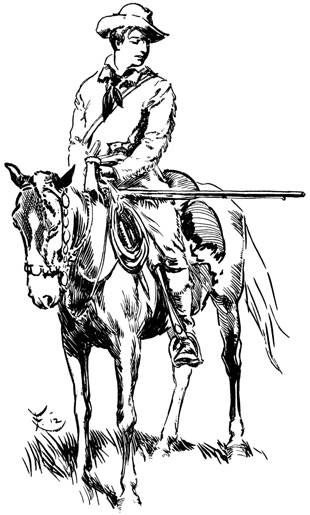
Then it was that I went out one day alone to the river bank, where I might have solitude and think how I could care for my mother as the only son of a widow should care for that person whom he most loves.
I had lived fifteen years. There was no trapper in the Northwest Company who could take more furs than I could. To ride and shoot were my pleasures, and my unhappiness was in being forced to set down words with a pen, or to puzzle my poor brain over long rows of figures which must have been invented only for the sorrow of Antoine Laclede.
My rifle and Napoleon, a small spotted pony that could outkick any beast this side the Rocky Mountains, made up all I owned of value, and yet with them I must earn enough to support my mother and make her comfortable. 14
The truth is, I might have joined with some free trader who had known my father, working for a small wage, which would not be more than enough to supply my mother with food and clothes such as had been provided by my father; but I must earn more than that, lest the day should come when, from wounds or sickness, I could not hold up my end with my companions on the trail or with the traps.
All this made my heart heavy as I sat there on the river bank asking myself what there was a lad like me could do.
Just at that time, when I was most downhearted, a man, tall of stature and spare in flesh, came up close beside me, and, as it seemed, looked down with much mirth in his heart, perhaps because I carried such a woebegone expression on my face. 15
Then, much to my surprise, he said, speaking in what seemed an odd tone, much as though he had a cold in his head:—
"Are you the son of Laclede, the free trader who was killed by the Blackfeet Indians not so long ago?"
I was ever proud to own that I was my father's son, and speedily gave the stranger an answer, although at the same time asking myself whether there was any good reason for such a question, or if he was intending to make sport of me.
"I am told that you have been over the trail 'twixt here and the Oregon country with your father, lad?"
"I have been twice into the land of the Walla Wallas, but no farther than that, although it would have pleased me well could I have seen the great ocean."
"Now I am not so certain where the country of what you call the Walla Wallas may be," the man said with a puzzled expression upon his face, whereupon I answered quickly, proud because of being able to tell:—
"It is this side the Cascade Range, the other side of the Blue Mountains, near where the Columbia River takes a sharp turn to the westward."
"The Columbia River, eh?" the man repeated, as 16 if satisfied with my reply. "Then you surely must have traveled near to the Pacific Ocean?"
"I have been so near that one might go down the river to it in a canoe, if he were so disposed; but there is a station of the Hudson's Bay Company near the coast and we free traders who deal with the Northwest Company have no desire for traffic with those who would shut us out from St. Louis, fearing lest we may cut into their trade."
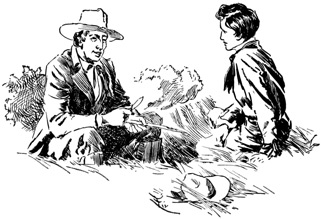
The man seated himself by my side as if satisfied that I was the one whom he sought, and began his business by saying:—
"My name is John Mitchell. I am at the head of a party of thirty men, women, and children who are bound for the Oregon country. We are taking with us forty head of oxen, twenty horses, ten mules, and thirty cows, to say nothing of the remainder of the outfit. I counted on meeting here at St. Louis a man who would guide us across, but find 17 that he has left us in the lurch, likely because of getting a better offer from some other company of settlers. Now I have been told that you could serve us as guide; that you are what may be called a fairly good hunter; and, although you look a bit too young for the business, there are those here in St. Louis who say you may be depended upon. What about guiding my party across? We are willing to pay considerably more than fair wages—"
"It may not be for me to do any such thing," I replied quickly, although at the same time wishing I could go once more into the Oregon country and do a man's work as guide. "I have here my mother, who has no other to depend upon, and I must stand by her, as a son should."
"Well said, lad, well said. It does you credit to think first of your mother; but we are willing to pay considerable money to one who can guide us, because this kind of traveling is new to all my party. Already in coming up from Indiana we have had trouble with the cattle and with the teams. Now say three hundred dollars for the trip, and if you are minded to take your mother with you we stand ready to let her share in whatsoever we have."
There is no reason why I should set down all we said, for we sat there on the river bank until an hour had passed, talking all the while. 18
Each moment I grew more and more eager for the adventure, until it seemed to me I had never had but one desire in life, and that to go into the Oregon country and make there a home for my mother.
I promised to meet the man again that evening and went straight away home to lay the matter before my mother. It surprised me not a little that she seemed to be in favor of going to the Oregon country, and I have since been led to believe that her willingness to abandon the home in St. Louis came from the wish to make a change and to leave that place where everything must needs remind her of my father.
Before seeking out John Mitchell, whose company was encamped on the opposite side of the river, I visited a neighbor who had once offered to buy our home. With him I agreed that for a certain sum of money he should take possession of the house, using it as his own until my mother and I came back, or, in case we remained in the Oregon country, then he was to pay us as many dollars as we agreed upon.
That afternoon, an hour before sunset, I paddled across the river to where John Mitchell's company was encamped, and for the first time I questioned whether it might be possible for me, a lad only fifteen years of age, to guide all these people, who seemingly 19 had no more idea of what was to be encountered in a journey to the Oregon country, than if they had never heard of such a place.
I dare venture to say there could not have been found in St. Louis a lad over ten years old who would have shown so much ignorance in forming a camp, as did John Mitchell, who held himself commander of the company.
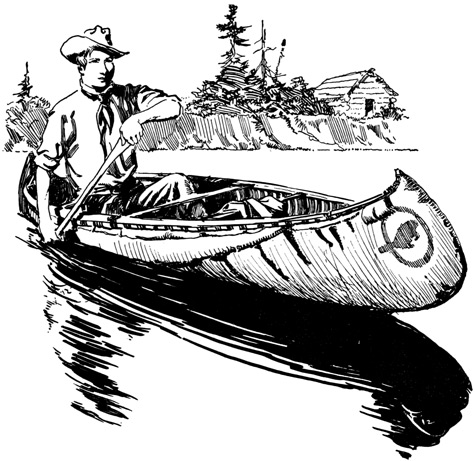
True, there was no reason why they need guard themselves as if in the country of an enemy. Yet 20 if they were careless at the start, heeding not the common precautions against the stampeding of their cattle, or the possibility that prowling Indians might steal whatever lay carelessly around, then surely when in a place where danger lurked, they could not be depended upon to care for themselves in a sensible manner.
Somewhat of this I said to John Mitchell while looking around the encampment, and that he himself was ignorant of what might be met with on a journey to the Oregon country, was shown when he asked:—
"And are you reckoning, lad, that we may come upon much danger?"
"Ay, sir, and plenty of it," I replied. "Just now the Indians are quiet, so I have heard it said by the traders; but even when there is no disturbance of any account, you are likely to come upon roving bands that will make trouble. Even though they may do no worse, you can set it down as a fact that from the time of leaving the settlement of Independence, where the journey really begins, until you have come into the Walla Walla country, there will be hardly a day, or, I should say, a night, when you are not in danger of losing your stock through these red thieves."
There was one thing in favor of John Mitchell, as I looked at the matter, which was that his outfit was 21 most complete. He had five well-made carts with straight bodies, and sideboards from fourteen to sixteen inches wide running outward four or five inches; in other words, what are called "Mormon wagons," and to three of these he counted on putting four yoke of cattle apiece. I was not so well satisfied with this, for the beasts had been raised in Indiana, and therefore were not accustomed to eating prairie grass, which would be the greater portion of their food during the journey.
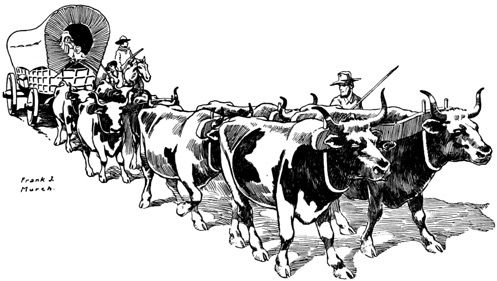
I had always heard it said that Illinois or Missouri cattle could stand the journey to the Oregon country better than any others, although then I did not know it from my own experience.
The ten mules were to be used for the hauling of the two remaining wagons. To one of these would be harnessed six of the animals, and the other, in which many of the women and children were to ride, was to be drawn by four. The horses were to be used under the saddle. 22
I was forced to admit that Mitchell had not been niggardly in outfitting his company.
He had no less than five sheet-iron stoves with boilers, one being carried on a small platform at the rear end of each wagon. There were tents in abundance for all the company, while for cooking utensils, there were plates and cups and basins of tinware, half a dozen or more churns, an ample supply of water kegs, and farming tools almost without number.
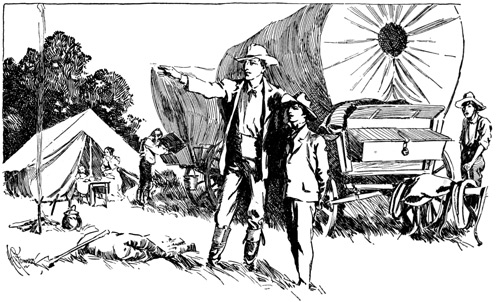
I had little or no interest in this part of the outfit, but took good care to make certain there were ropes and hobble straps in plenty for tying up the horses and fettering those that were likely to stray, because I knew from experience how much of such supplies might be lost or stolen during the long journey. 23
The weapons carried by the men were of heavier caliber than I would have suggested, unless they counted on using them wholly for buffalo shooting. John Mitchell took no little pride in showing me his rifled gun which carried thirty-two bullets to the pound, when to my mind fifty-six would have served him better for general work; but that was really no concern of mine.
We talked over the matter fairly and at great length, all the men of the company and some of the women taking part in the parley. The bargain, as I understood it, was that I was hired for no other service than to guide this company, and also to make suggestions as to the best places for camping, as well as how we could keep the people supplied with fresh meat.
It was agreed that my mother should ride in the four-mule wagon with John Mitchell's family, which consisted of his wife, a girl about my own age by name of Susan, and three awkward-looking boys. The oldest of these lads was not more than ten, I should think, and all of them were so clumsy that it seemed almost impossible for them to avoid treading on their own feet. About mounting a horse or rounding up cattle, they knew no more than my Napoleon knew about good manners. 24
Susan, however, was a sprightly girl, who, as it seemed to me, had more good sense in her little finger than might be found in all the rest of the family. Before my visit was at an end, she came to ask concerning this or that which we might meet with on the way, and I believed I had found one who would be a most desirable comrade.
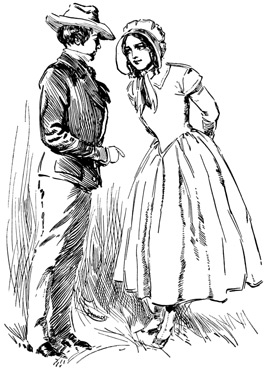
Unless I mistook her entirely, she was a girl to be depended upon in the time of trouble, and when one would travel from the Missouri River to the Oregon country, it is of the greatest importance to have with him only those who can be relied on to a certainty when danger lurks at hand, as it surely does, so I have heard my father say, from the time the voyager leaves the Kansas River until he has come to the Columbia.
It was agreed that my mother and I should have a day in which to make ready for this journey, which, if we met with no serious mishaps, would require not less than five months to make; therefore it can well be understood that we had little time to spend in sleep, 25 if we would present ourselves to John Mitchell at the hour agreed upon.
It is my desire never to make a promise which I do not, or cannot keep; consequently there were many things left undone in St. Louis when mother and I crossed the river; but it was better thus than that I should disappoint ever so slightly those with whom I had made a positive agreement.
In order that one may the better understand how much of a journey it is from the Missouri River to the Oregon country, I set down here the fact that at eleven o'clock in the forenoon, on the twenty-fifth day of April, in the year 1845, we, meaning John Mitchell's company, my mother, and I, set off on that long march. The real journey would not begin until we had passed that settlement on the Missouri known as Independence, which is the point of departure for those who count on traversing the Oregon or the Santa Fe trail.
Therefore concerning this portion of our march I shall content myself simply with saying that we arrived at Independence on the morning of May 6th, and made camp two miles beyond, on the bank of a small creek, where there was plenty of grass for the cattle.
It must be understood that up to this time we had been traveling through one settlement and another 26 in a portion of the country where were to be found as many people as lived, mayhap, in the neighborhood from which John Mitchell had come. Yet so awkward were the men and boys, that while we were traversing beaten roads they found it exceedingly difficult to keep the cows from straying or the oxen from stampeding even while they were yoked and hitched to the heavy wagons.
I do not claim to have had any experience at driving oxen or herding cattle, and therefore I held myself aloof, saying it were better these people from Indiana should learn their lesson when there were but few difficulties in the way and no dangers, so that after we should come where the real labor began, they might at least have some slight idea of what was expected of them.
But for the fact that Susan Mitchell, riding upon a small black, wiry-looking horse, held herself well by my side, I would have been disheartened even before we had really begun the journey, because I was looking forward to what we must encounter, and saying to myself that unless these people could pull themselves together in better fashion, we were certain to come to grief.
When a company fails to herd thirty cows, over 27 what might well be called a beaten highway, what would you expect when in a country where the Indians are doing all they can to stampede and run off cattle as well as horses?
I soon saw that Susan was a girl of good understanding, for without a word having been spoken, she seemed to realize those fears which had come into my mind, and said again and again as if to strengthen my courage:—
"They will know more about this kind of traveling when we reach Independence."
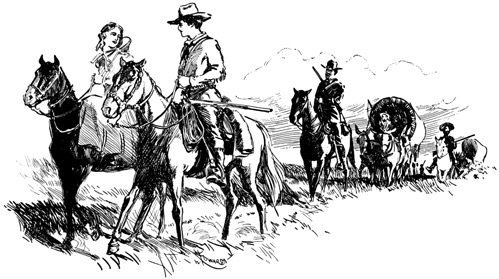
I could not refrain from saying in reply that unless they learned more speedily it would be well we waited a full year at Independence, rather than attempt a journey where so much danger and hardship awaited us.
I venture to say that there was not one among John Mitchell's company who could have put a pack upon a horse in such a manner that it would hold in 28 place half an hour over rough traveling; and as for handling a mule team, the driver of that wagon in which my mother rode had no more idea of how the beasts should be treated than if he had so many sheep in harness.
To show how ignorant these people were regarding the country, I have only to say that from the moment we left St. Louis one or another was continually asking me whether we were likely to come upon buffaloes before the night had set. The idea of buffaloes between St. Louis and Independence, save perchance we came upon some old bull that had been driven away from the herd by the hunters!
It was by my advice that John Mitchell decided to overhaul his outfit at Independence in order to learn whether there might be anything needed, for after having left the settlement we would find no opportunity of replenishing our stores save at some one of the forts, and then it was a question, serious indeed, whether we could get what might be needed.
The tents were hardly more than set up, and the women had but just got about their cooking, for the breakfast had been a hasty meal owing to our being so near the settlement, when we were visited by a dozen or more Kansas Indians, who are about as disreputable 29 a looking lot as can be found in the country—dirty, ill-favored red men with ragged blankets cast about them, and seeming more like beggars than anything else.
To tell the truth, I would rather have seen around the camp a Blackfoot, a Cheyenne, or a Sioux, knowing that any of them would murder me if he had a fair opportunity, than those beggarly Kansas savages.
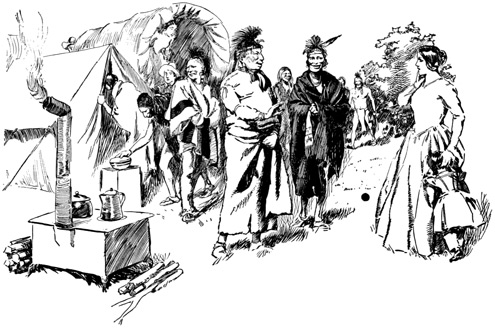
It was the first time any of the women of our company, save my mother, had seen an Indian near his own village, and straightway all of them, with the exception of Susan, were in a panic of fear, believing harm would be done.
Even John Mitchell was undecided as to how he should treat them, until I told him that any attempt 30 to drive the creatures away would be useless, and that if his people were so disposed they might give them some food; but it was in the highest degree necessary that sharp watch be kept, else we would find much of our outfit missing after the visitors had taken their departure.
The men and the boys of our company were so disquieted because of having come thus suddenly upon the Indians, that they kept good watch over the camp during this first day, and it would have been well for all of us if they had continued to stand as honest guard over their belongings.
It was found that we were needing extra bows for the wagons, meaning those bent hoops over which the canvas covering is stretched, that the supply of shoes for the horses and mules was not sufficient, and, in fact, there were half a hundred little things required which the women believed necessary to their comfort.
Therefore John Mitchell and I went into the settlement to get what was wanted, and, like the good comrade she gave promise of being, Susan insisted on going with us.
Independence was much like a trading post, save that there were no blockhouses; but the log tavern had the appearance of a building put up to resist an attack, and the brick houses surrounding it were made 31 with heavy walls in which were more than one loophole for defense.
The idea that the settlement was a frontier post was heightened by the number of Indians to be seen, while their scrawny ponies were tied here and there in every available place.
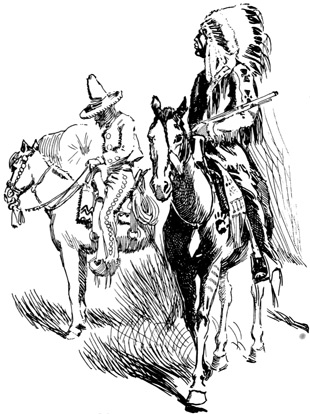
There were the wretched Kansas, only half covered with their greasy, torn blankets, Shawnees, decked out in calicoes and fanciful stuff, Foxes, with their shaved heads and painted faces, and here and there a Cheyenne sporting his war bonnet of feathers.
The scene was not new to me, and so did not invite my attention; but Susan, who seemingly believed that she had suddenly come into the very heart of the Indian country, was so interested that I went with her here and there, while her father was bartering in the shops, and before an hour had passed her idea of an Indian was far different from what it had been before she left her home in Indiana. 32
I had nothing to say against the savages more than can be set down when I speak of the murder of my father, and save for the fact that Susan was so eager to see all she might, and that everything was so strange to her, I would not have lingered in the settlement a single minute longer than was necessary to complete our outfit.
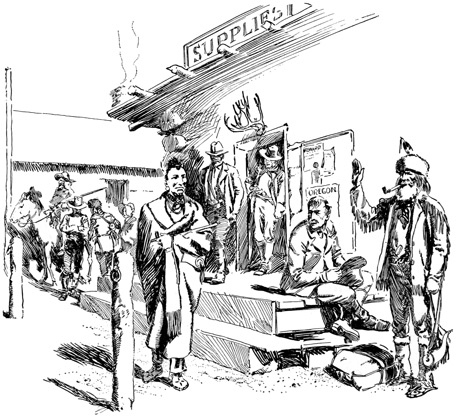
There were here Santa Fe traders in Mexican costume; French trappers from the mountains, with their long hair and buckskin clothing; groups of 33 Spaniards, who were evidently bound down the Santa Fe trail; and here and there and everywhere as it seemed, were people from the States, emigrants like those who followed John Mitchell, to the number, I should say, of not less than two hundred, all expecting to make homes in the Oregon country.
It saddened me to think of what was before these people. To gain the banks of the Columbia River they must travel more than two thousand miles, in part over sandy plains, where would be found little or no water for themselves and scanty feed for their animals. There were rivers to be crossed where the current ran so swiftly that a single misstep might mean death. Mountain ranges were to be climbed when even the strongest would find it difficult to make progress, and all the while danger from wild beasts or wilder men.
And it was I who must show these men when and where to camp, how to bring down the game which would be necessary for their very existence, and lead them, in fact, as one might lead children.
We remained in camp by the creek until next morning, and then our way lay over the rolling prairies, where was grass on every hand and water in abundance, yet we made only fifteen miles between eight 34 o'clock in the morning and within an hour of sunset, owing to the awkwardness of those who were striving to drive our few head of cattle.
Then came the first real camp, meaning the first time we had halted where it was necessary to guard everything we owned against the Indians, for we knew full well there were plenty in the vicinity of Independence, and I strove my best to show these people how an encampment should be formed on the prairie.
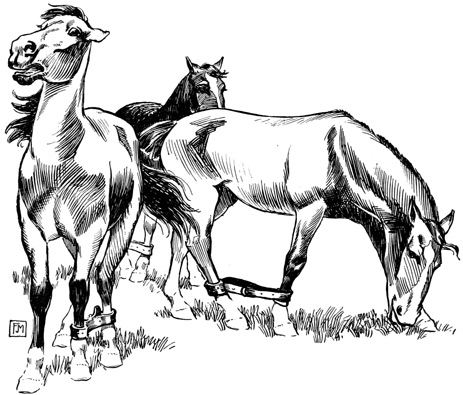
It was difficult to persuade John Mitchell that it would be better to give the horses and mules a side hobble, than to take chances of securing them by picket ropes. I had always heard that by buckling a strap around the fore and hind legs, on the same side, taking due care not to chafe the animal's legs, he could not 35 move away faster than a walk, while if he was hobbled by the forefeet only, it would be possible for him to gallop after some practice.
There were many in our party who claimed it was a useless precaution to hobble the horses, and insisted on fastening them to picket pins, doing so in such a slovenly manner that I knew if the animals were stampeded they could easily make their escape.
Before morning came we had good proof that carelessness in looking after the live stock at such a time is much the same as a crime.
When I proposed that watch be set around the encampment during the night, every man, even including John Mitchell, protested, saying it was a needless precaution, that they were all needing sleep, and there was no reason why any should stand guard when they could look around on every hand and make certain there was no one near to do them harm.
One of the women asked me if there might be any danger from wild beasts, and when I told her we had not yet come into that part of the country where such game were found, every member of the company believed I was only trying to show myself as the commander.
I heard one of the men say grumblingly to another, 36 that he was not minded to put himself under the orders of a boy who took pleasure in displaying his authority even to the extent of making them stand needless watch.
Never had I seen my father make camp, even though no more than two miles from a fort or a settlement, without carefully hobbling his horses, rounding up the cattle, if he had any, and stationing a picket guard, insisting that those on duty remain awake during every hour of the night.
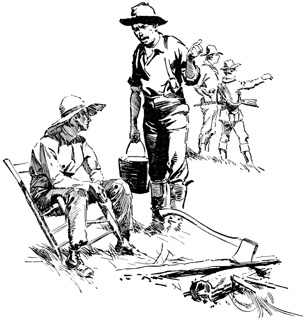
Now, however, these people from Indiana, who knew nothing whatsoever of traveling in the wilderness, claimed to have a better idea of how camp should be guarded than did I, who had already traversed the Oregon trail twice, and I so far lost my temper as to make no reply, saying to myself that if they were inclined to take desperate chances, the loss would be theirs, not mine.
Mayhap if we had been farther along the trail among the mountains, where the danger would be greater if we lost all our animals, then for my mother's 37 sake I might have insisted strongly that the orders which I gave should be obeyed.
As I have said, however, I held my peace, while those foolish people lay down to sleep in their tents, or in the wagon bodies, believing they were safe beyond any possible chance of danger simply because of being no more than seventeen miles from Independence.
I must say to John Mitchell's credit that he outfitted me as he would have done an older guide, and set apart for my especial use one of the small canvas tents.
Believing that my mother would have more comfort by herself than if she shared a bed in one of the larger tents, or in one of the wagons where so many must sleep, I proposed that she use my camp, and we two laid ourselves down that night feeling uncomfortable in mind, for she understood quite as well as did I that we were taking great chances at the outset of the journey.
I had hobbled Napoleon securely, as you can well fancy. In addition to that I had made him fast to a picket pin firmly driven into the ground so there might be no danger of his straying too far away.
It was not a simple matter to enjoy the resting time, because of the weight of responsibility which was upon me.
Even though John Mitchell's people were not inclined to obey such orders as I saw fit to give, yet I 38 knew that in event of trouble they would cast all the blame on my shoulders, and not until a full hour had passed were my eyes closed in slumber.
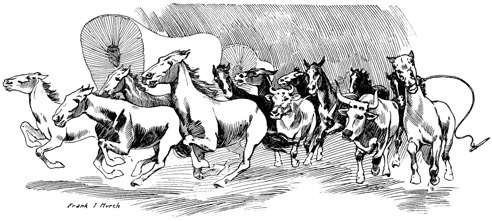
It seemed as if I had hardly more than lost myself in sleep when I was aroused by a noise like distant thunder, and springing to my feet, as I had been taught to do by my father at the first suspicious sound, I stood at the door of the tent while one might have counted ten, before realizing that a herd of those wild ponies which are to be found now and then on the prairies was coming upon us.
Once before in my life had I seen horses and cattle stampeded by a herd of those little animals, and without loss of time I rushed into the open air, shouting loudly for the men to bear a hand, at the same time discharging all the chambers of my weapon. 39
Unfortunately, however, I was too late to avert the evil. If we had had a single man on guard he could have given warning in time for us to have checked the rush; but as it was the ponies were within the encampment before I had emptied my weapon.
John Mitchell had not brushed the slumber from his eyelids before the ponies overran the camp and passed on at full speed, taking with them every horse, mule, ox, and cow we had among us, save only Napoleon, who would have joined in the flight had it been possible for him to do so.
"What has happened? What was it?" John Mitchell cried as he came running toward my tent with half a dozen of the other men at his heels, and I replied with no little bitterness in my tone:—
"A herd of wild ponies has stampeded every head of stock, except Napoleon."
"But my horse was made fast," one man cried, as if, because he had left the animal with his leading rope around a picket pin loosely driven, it would have been impossible for him to get away.
The driver of the four-mule team declared that his stock could not have been run off because he had seen to it that each animal was hitched securely, while a third insisted that we must have been visited by the Indians, who had frightened the beasts in order the better to carry them away. 40
I could not refrain from saying what was true:—
"If we had had but one man on guard this could not have happened. I tell you that the disturbance this night was caused by a herd of wild ponies."
"Then why do we not go in search of the stock?" John Mitchell cried, and I replied:—
"That you may do, if it please you; but I have never yet seen the man who, on foot, could come up with a horse that had joined the wild of his kind. When the morning dawns, I will do all I can to aid in gathering up the stock, but until then there is nothing to be done."
Then, with much anger in my heart because this thing had happened through sheer carelessness, I went back into my tent, nor would I have more to say to any member of the company, although no less than half a dozen men stood outside asking this question or that, all of which simply served to show their folly.
When day broke John Mitchell was man enough to meet me as I came out of my tent, and say in what he intended should be a soothing tone:—
"I am willing to admit, lad, that we showed ourselves foolish in not obeying your orders. From now on you can make certain every man jack of us will 41 do whatsoever you say. Now tell us how we had best set off in search of the stock."
"There is no haste. The horses and mules will run with the ponies until they are tired and need food, therefore we may eat our breakfast leisurely. My advice is that the company get under way, moving a few miles across the prairie to the next creek, while all, save those needed to drive the teams, go with me."
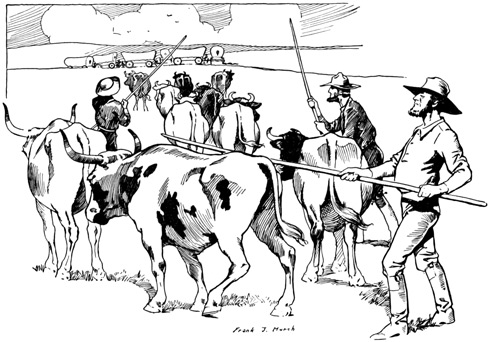
"But we can't start a single wheel. There is no ox, horse, or mule in the encampment," John Mitchell cried, and then my face flushed with shame because I had forgotten for the instant that we had no means of breaking camp.
There is little need why I should spend many words 42 in telling of what we did during that day. Within an hour we found one of the mules and succeeded in getting hold of his leading rope. Before noon we had overtaken all the cows and eight of the oxen, bringing them back to camp while the wild ponies circled around the prairie within seven or eight miles of us, as if laughing to scorn our poor attempts to catch the horses which they had stolen.
The afternoon was not yet half spent when we succeeded in gathering up all our stock save two horses and two mules, and then I insisted we should go on without them.
"Between here and the Columbia River we shall lose more stock than that," I said, "and if we are to reach the Oregon country before winter sets in, such misadventures as this must not be allowed to delay us."
I noted that more than one of the men wore a dissatisfied look, as if believing we should remain at this camp until all the stock had been found; but mayhap they remembered that the loss was caused by their not listening to me, and not a word was said in protest.
Next day, without giving further heed to the horses and mules that were with the pony herd, we pushed forward toward the Oregon country once more, traveling 43 twenty-two miles and in the meanwhile crossing the Wakarusa River.
Then came a stretch of prairie land, and after that, near nightfall, we arrived at the Kansas River, where camp was made.
This time you may set it down as certain that when I claimed we ought to set a picket guard, there were none to say me nay. Even more, I noticed that every man carefully hobbled his horses or his mules, as I hobbled Napoleon, and when I went into my tent I said to myself that we need have no fear of trouble that night.
When we started out next day, Susan Mitchell insisted on riding by my side. She held her place there until we made camp, although it was no slight task, for while the company was passing over twenty miles of distance, I had ridden from the front to the rear of the train mayhap twelve times, thereby almost doubling the length of the journey.
Not once did the plucky girl show signs of faltering, even though a good half of the day's march was up the side of a ridge and along the top of it, where the way was hard even for those of us who were riding light.
We were traveling within two or three miles of the Kansas River, not yet having come to the ford, when 44 at about four o'clock in the afternoon we overtook a company of people who were bound for the Oregon country, having in their train twenty-eight wagons.
At first John Mitchell was eager to join the strangers as they suggested; but he lost much of the desire on being told that two miles in advance was another party having nearly a hundred wagons. I really believe the man grew confused when he learned there were so many people on the Oregon trail.
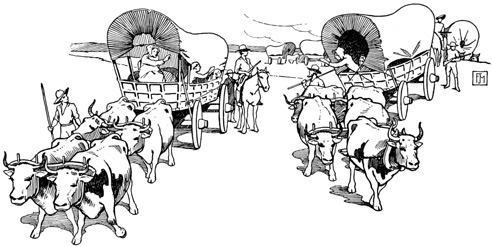
When he asked my advice as to joining the larger company, I told him that my father had ever said if he could travel independently of any one else, it was profitable for him to do so, for then he was forced neither to go faster than he desired, nor remain idle when it pleased him to push on.
I asked John Mitchell how much he could gain by forming a small part of such a large company, unless, 45 perhaps, he intended to dismiss me as guide, whereupon he assured me heartily that he had no such idea, but it seemed to him we might join the strangers for mutual assistance.
It was not for me to do more than offer advice, and I told him that unless we came upon hostile Indians, we had best continue on by ourselves, for the time was coming, and not very far in the future, when we should be put to it to find grass for the cattle and fuel with which to cook our food. At such times the smaller the company, the less chance for suffering.
It was Susan who settled the matter, for she said very decidedly that I, who had already traveled over the Oregon trail twice, ought to know more about such affairs than any other in the company.
When she had spoken, her father held his peace as if convinced that her words were wise.
We did not overtake the company of a hundred wagons that night, but camped near a small brook about four miles from the Kansas River, I having led the people off the trail a mile or more so that we might not be joined by those emigrants in the rear.
Next morning we traveled four miles to the river ford, and there found the water already so high that there was nothing to do but to ferry our wagons over in a flatboat owned by a man named Choteau whom I had already known in St. Louis. 46
He was no relative of that famous Choteau of the fur company, but a very obliging Frenchman indeed, who, because of his acquaintance with me, did all he could to hasten our movements. It was necessary we have a friend in such work, for it was a hard task to make the journey back and forth across that muddy stream, which was at least two hundred and fifty yards wide, when we could carry only one unloaded wagon at a time.
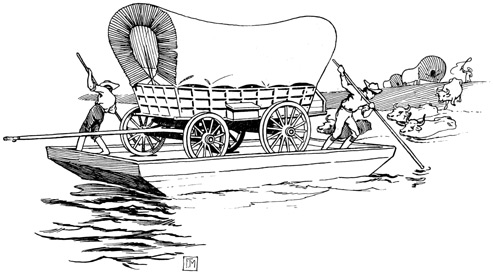
It was nearly nightfall before we were all across with our outfit and cattle, and then I gave the word that we should encamp within a mile of the stream, for I was not pleased with the appearance of dark clouds which were rolling up from the west.
It would have been better had I halted the company 47 when we first crossed, for before we could get the tents up and the wagons in place, a terrific storm of thunder and lightning was upon us.
Instantly, as it seemed, our oxen and cows were stampeded, rushing off across the prairie like wild things, and although I did my best to round them up, all efforts were vain.
There was nothing for it but to let them go, and seek shelter from the downpour of water, which was so heavy that at times one could hardly stand against it.
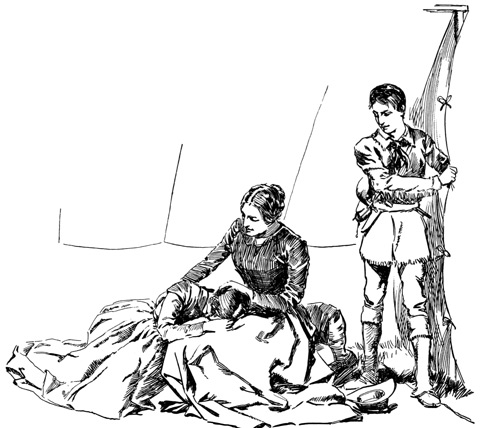
Susan Mitchell had followed my mother into the tent which I had taken care to set up immediately we halted, and because there was no other shelter save the overcrowded wagons, the girl was there when I 48 entered. It made my heart ache to see the evidences of her fright. Well was it for her that she was with my mother, for I truly believe none could have soothed her fears so readily.
I left the two together while the storm was at its height, and sought shelter in one of the wagons, believing the tempest would continue to rage throughout the night.
Next morning, before day had fully come, I aroused all the men. We saddled our horses and set out in search of the cattle, John Mitchell saying in a grumbling tone as he rode forward, that it seemed to him as if he was "doing more in the way of running down oxen and cows, than in making any progress toward the Oregon country."
Hardly realizing how true my words might prove to be, I told him laughingly that we were likely to get more of such work as the days wore on, rather than less, and another four and twenty hours had not passed before he came to believe that I was a true prophet.
Not until noon did we succeed in getting all the live stock rounded up, and I believed we were exceedingly fortunate in not losing a single animal, for it seldom happens, as I have heard, that cattle can be stampeded during the night and every one brought into camp next morning. 49
It was my belief that we ought to travel rapidly during the afternoon and until a reasonably late hour in the night, in order to make up the time we had lost; but it is one thing to say and quite another matter to accomplish.
After traveling no more than three miles we arrived at Big Soldier Creek. As Susan and I were riding on in advance to make certain the ford was safe for heavy wagons, I saw coming down over a slight incline a band of mounted Indians, who immediately, on seeing our company, came forward at full speed, brandishing bows and arrows, or guns, accordingly as they were armed, and yelling furiously.
Susan Mitchell screamed with fear, as well she might; but I had already seen just such an Indian maneuver and knew what it meant. I hurriedly told her to ride back and join the company, while I held Napoleon steady.
Their intention was to stampede the cattle, as I well knew, and although it would have been unwise for me to have sent a bullet among them, it was my purpose to do so if I failed in checking their advance otherwise.
Then Napoleon took the matter into his own hands, 50 or, I should say, his own feet, for when the Indians were perhaps thirty yards away he wheeled about, flinging up his heels as if he counted on kicking the entire band over the ridge.
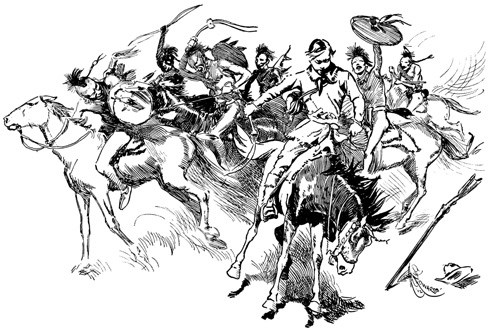
Do what I might I could not get the stubborn animal wheeled around before the savages had rushed by me, whooping and yelling in such a manner as caused a panic among our company and a stampede of the beasts.
The oxen wheeled around in the yokes until they were so mixed up that the most expert would have found it difficult to untangle them, while the cows, their tails straight up in the air, fled back over the trail, bellowing with fright. 51
By the time all this mischief had been done, Napoleon was ready to attend to his own business once more, and I rode among the company to find the people in such a state of panic and fear as one would hardly credit.
"Get your rifles and follow me!" I shouted as I rushed forward, and it is quite certain that more than one of the men cried after me to come back, for all were so terrified that they would have suffered the loss of the stock rather than make any attempt at reclaiming it.
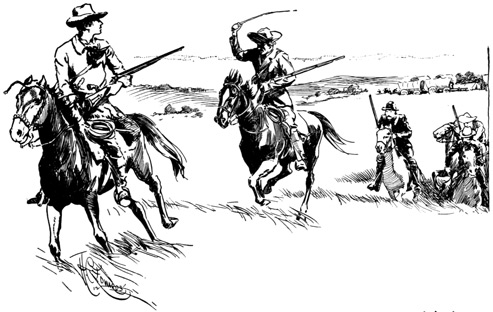
It must not be supposed that I am trying to make it appear as if I was wondrously brave in thus giving chase. I knew from the experience gained while with my father, that there is but one way to treat these savages, and that is to put on a bold front. 52
After doing any mischief the Indians would go farther and farther, until having accomplished all their desires, if their victims made no attempt to defend themselves; therefore it was necessary that we make a decided stand.
I knew full well that if we pursued, these Pawnees, as I judged them to be, would speedily be brought to their senses. Whereas if we remained idle in camp they would run off all the stock, and for us to lose that herd of cows at the very outset of the journey would indeed have been disastrous.
It was fortunate for those under my charge that they followed as I commanded, even though they did not do so willingly. When we had ridden at our best pace six miles or more, we came upon all except three of the cows who, wearied with their mad race, were now feeding; but not a feather of an Indian could be seen.
That the Pawnees knew we were coming in pursuit, there could be no doubt, and because they were not in war paint I understood that they must have an encampment near by.
Therefore, as soon as we had rounded up the cattle, I told John Mitchell it was our duty to search for the Indian camp, and there demand that they return to us, or aid us in searching for, the cows we failed to find. 53
The man looked at me uncertainly an instant, as if questioning whether we had the pluck, as the Easterners say, to ride into an Indian encampment. Then he said grimly, almost as if doubting his own judgment:—
"I shall do as you say, boy; but if mischief comes of it, remember that I hold you responsible."
"Mischief will surely come of it if we fail to put on a bold front," I replied hotly, and then wheeling Napoleon around, I sent him ahead under the whip, which he richly deserved because, but for his foolish trick of kicking, all this mischief might have been spared us.
We rode through our encampment, for by this time the lads and the women had set up some of the tents, while one of the men who had remained behind was straightening out the oxen, and from there on a distance of about three miles, when we found that for which we were searching.
It was a Pawnee village, and in it there might have been forty men, women, and children, occupying say, ten tepees, or lodges, while there were so many ponies and dogs that one would hardly have had the patience to count them.
We could see no signs of our cattle, nor did I expect 54 to find them there; but, riding directly into the center of the village, I brought Napoleon to a standstill, at the same time demanding in the Pawnee language, or such smattering of it as I could command, to be brought to the chief.
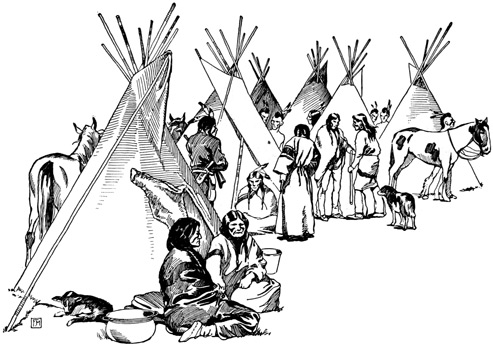
Within a minute he came out from one of the lodges, and it gave me more courage when I noted the fact that he was looking disturbed in mind.
I demanded that he, or some of his tribe, return to us the cows which had been driven away.
If there had ever been such a being as an honest Indian, then I might have believed we had come upon him, for this chief, knowing there were men enough in our company to wipe out his entire band, declared 55 again and again, with no little show of innocence, that neither he nor his young men had had anything to do with our cattle.
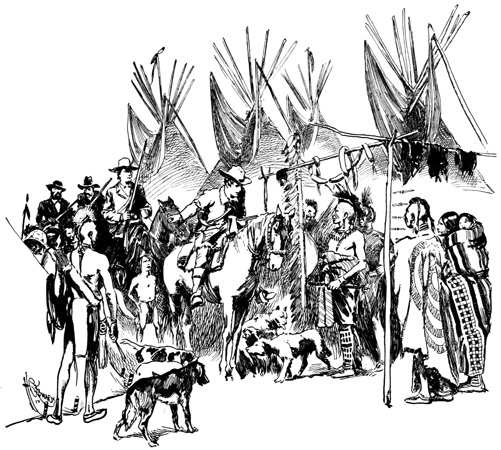
Straightway I pointed here to one fellow and there to another, as two whom I recognized among those who had ridden over the ridge, and called the attention of the chief to the ponies at the farther end of the village, which were yet covered with perspiration.
Instead of staying there to parley with the fellows, I insisted that the cows be brought to us before another 56 day had passed, and made many threats as to what would happen in case my demands were not complied with.
Then we rode out of the village. When we were some distance away, John Mitchell asked in a bantering tone if I really expected to see the cows again, whereupon I told him we would not move from the present encampment, save to punish the rascally Pawnees, until every head of the three had been brought to us.
Because he laughed I saw that he believed that he never would see his cattle again; but I was better acquainted with the Pawnees than he.
Because of all that had happened I found no reason to complain of the manner in which watch was kept over the encampment that night, and at a fairly early hour next morning, even before I had begun to expect them, the Indians came into camp with two of the cows. They talked much about their innocence so far as causing a stampede and claimed that it was not possible to find the third beast.
The Pawnee who acted as spokesman would have tried to make me believe they were simply in sport when they overrode our camp; but I let him know that I was acquainted with such thievish tricks, and 57 threatened them as to the future, much as though I had a company of soldiers at my back.
It may be that the Indians were not greatly frightened by what I said; but certain it is that the members of John Mitchell's company began to believe that I was to be treated less like a boy, and more after the manner of one who knew somewhat regarding the work in which we were engaged.
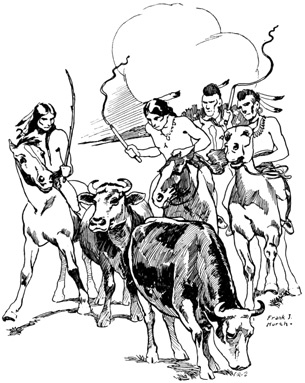
They gave more heed to my words from that time on, and Susan Mitchell seemed to think I had done some wondrously brave deed when I frightened the cowardly red men, or attempted to; but we never again saw that third cow.
I believe that the Pawnees had hidden her, intending to have a great feast after we had gone away; but I dared not go any farther in the way of threats lest they openly defy me, when I would have been powerless because the men of our company were not equal to fighting the savages.
I could have told Susan that if we had come across 58 a party on the warpath, then my words would have been laughed at, and I might have found myself in serious trouble through making threats which could not be carried into execution.
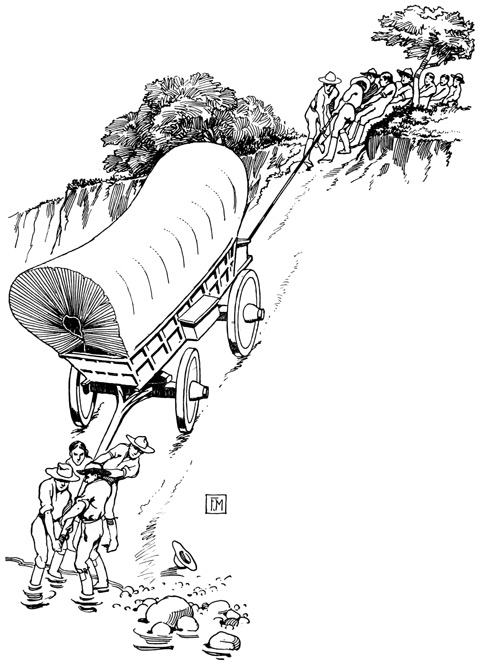
Because of having been thus delayed by waiting for the cattle, we traveled only five miles on this day, which, if I remember rightly, was the 14th of May. Then we arrived where Big Soldier Creek must be crossed, an undertaking I had been looking forward to with no little anxiety because the banks of the creek are very steep and it is impossible to drive either 59 mules or oxen down to the bed of the stream while attached to the wagons.
We were forced to unyoke the oxen and unharness the mules, after which we let the wagons down by means of ropes, with four men to steer the tongue of each cart.
The ford was shallow, but on the other side the banks loomed in front of us like the sides of a cliff. In order to get even the lightest wagon to the top we had to yoke all the oxen in one team, and even then every man of us put his shoulder to the tailboard, pushing and straining as we forced the heavy vehicle straight into the air, as one might say.
One entire day was spent in crossing, and within an hour of sunset we pitched our tents on the high banks, where we let down buckets by ropes in order to get water for cooking,—this method being easier than scrambling up and down the steep incline.
Before night had come a party of about sixty from the Ohio country joined us, having fifteen wagons.
They were unaccustomed to such traveling, as I understood after seeing them make camp. When the leader came up to John Mitchell, proposing that we journey together from then onward, claiming that by thus increasing the numbers each company would be in greater security from the Indians, I gave my employer a look which I intended should say that we would travel as we had started, independently. 60
From this point on to the Little Vermilion Creek was eighteen miles over high, rolling prairie, and I believed we ought to make it in one day's travel, which we did.
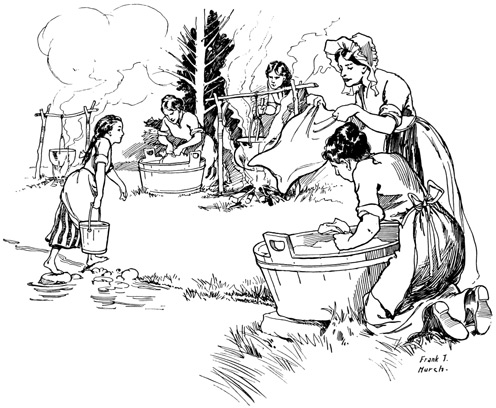
We arrived at the creek about four o'lock in the afternoon, and within thirty minutes it seemed as if the banks of that small stream were literally lined with fires, over each of which was suspended a kettle filled with water. Tubs were brought out from all the wagons, for the women of our company had decided 61 on making a "wash day" of the three or four hours remaining before sunset.
On seeing that Susan Mitchell was not taking part in this labor, I proposed that we ride five or six miles onward, where I knew would be found quite a large village of Kansas Indians. She was only too well pleased with the proposition, even though having been in the saddle since early morning.
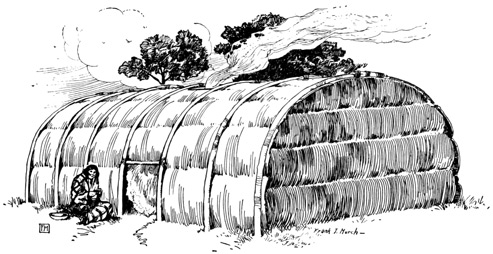
To me one Indian village is much like another; but before we had come to the end of our journey Susan could point out the difference between a Kansas, a Pawnee, a Cheyenne, or a Sioux tepee.
The Kansas Indians make their houses about thirty feet in length by fifteen feet wide, and build them by sticking hickory saplings firmly into the ground in the shape of the lodge desired. These are bent to form an arch eight to ten feet in height, when the tops 62 of the saplings are bound together by willow twigs. This forms the inner framework, which is covered with bark taken from linden trees; over this is another frame of saplings, also tied with willows, to bind the whole together securely and prevent the coverings from being blown away during a high wind.
Each of these lodges has one small door about four feet in height and three feet wide, while at the top of the hut is an opening for the smoke to pass out, when a fire is built in the center of the floor during cold or stormy weather.
There were in the village when we arrived but few women and children, with here and there an old man, all the hunters having gone out, as I learned, hoping to find antelopes near at hand.
Understanding by this information that there would be no attempt made to hinder us from gratifying our curiosity, I led Susan into one of the largest of the empty lodges. She was filled with wonder because of the pictures, drawn with charcoal and colored with various paints, which were to be seen on the inside of the bark walls.
There were mounted men fighting with bows and arrows, horses hauling wagons, figures of beasts and reptiles, all done as one can well fancy in a rude way; 63 but to Susan they afforded no little amusement, and she would have remained studying them until after nightfall, had I not insisted that we must return to camp before darkness.
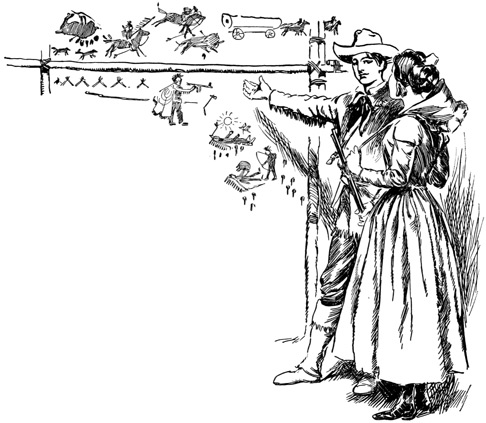
It was an odd picture which our encampment presented when we rode in just at twilight. The women had finished their washing, and, having no ropes on which to stretch their clothes, had hung them on wagon wheels and the tongues of the carts, in fact, on everything available, until the entire place had much the appearance of a gigantic, ragged ghost.
Because so much time was spent next morning in gathering up these garments and packing them away, we traveled only twelve miles, arriving at the bank of a small stream with all the animals, save the saddle horses, showing signs of weariness. 64
I insisted we should take a day for resting the cattle, although John Mitchell would have pushed on, regardless of their condition; but I knew we must keep them in good shape, else when we arrived at the more difficult portion of the journey they would fail us entirely. Perhaps because of our experience with the Indians, the men failed to grumble at the delay.
Every member of the party was not only willing, but eager, to set out after our long halt, for we had a most disagreeable experience with wood ticks, little insects much like those that worry sheep. They covered every bush as with a veil and lay like a carpet over the ground as far as one could see.
I have never come upon them in such numbers, and before we lay down to rest I wished a dozen times that I had delayed the halt another day.
These ticks fasten themselves to a person's skin so tightly that, in picking them off, the heads are often left embedded in the flesh, and unless carefully removed, cause most painful sores. It was like one of the Plagues of Egypt such as I have heard my mother read about, and so much did our people suffer that John Mitchell came to me in the middle of the night, urging that we break camp at once rather than remain there to be tortured. 65
I soon convinced him that we could not hope to drive the cattle in the darkness, without danger of losing one or more, therefore he ceased to urge; but before the sun had risen, all our company were astir making preparations for the day's journey.
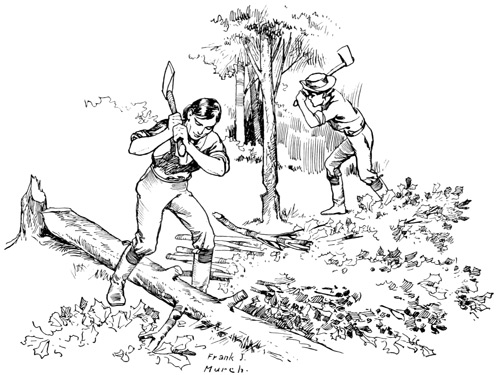
Early though it was when we set off, only fourteen miles were traveled, owing to the difficulty in crossing the Big Vermilion River.
The banks of the stream were steep and the channel muddy, affording such difficult footing for the animals that we were forced to hew down many small trees and lop off large quantities of branches to fill up the 66 bed of the river before the wagons could be hauled across. All this occupied so much time that after arriving at the opposite bank we traveled only one mile before it was necessary to make camp.
On this night we were not troubled by wood ticks, yet I had the camp astir early next morning, knowing that before nightfall we must cross the Bee and the Big Blue Creeks, therefore much time would be spent in making the passages.
The difficulties which I had anticipated in crossing the creeks were not realized. We got over in fairly good shape, being forced on Bee Creek to double up the teams in order to pull the wagons across, and when night came we were two and a half miles west of Big Blue.
There I believed we should make a long halt, for the country was covered with oak, walnut, and hickory trees, and, if I remembered rightly, this would be the last time we could procure timber for wagon tongues, axletrees, and such other things as might be needed in case of accidents.
It was well we came to a halt early, for the tents were no more than up and the wagons not yet drawn in a circle to form a corral for the horses, before the 67 most terrific storm of rain I ever experienced burst upon us.
The women had but just begun to cook supper. The first downpour from the clouds quenched the fires, making literal soup of the bread dough, and it was only by building a small blaze under one of the wagons, where it would be partly sheltered from the storm, that we could get sufficient heat to make coffee.
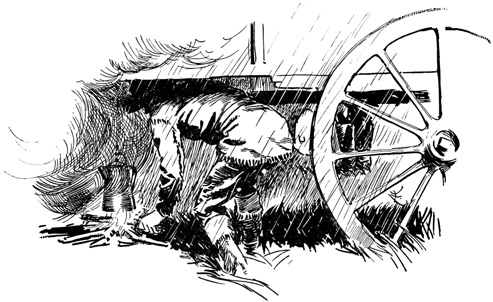
Before this was done—and nearly all us men took part in it, for the storm was so furious that the women could not be expected to remain exposed to its full fury—no less than two hours were spent, and I had almost forgotten that the encampment and all within it were under my charge. 68
Each moment the storm increased, and had I been attending to my duties instead of trying to play the part of cook in order to enjoy a cup of coffee, I would have noticed that the cattle were growing uneasy. After standing with their tails to the storm for a while, they began milling, that is running around in a circle, and by the time I gathered my wits every animal was galloping off across the plain.
Fortunately the horses and mules were properly hobbled, and, in fact, some of the saddle beasts had been brought into the corral formed by the wagons; therefore when John Mitchell would have set off in pursuit of the oxen and cows despite the terrific storm, I insisted that he take such ease in camp as was possible because on the following morning we, mounted, would quickly round up the stampeded cattle.
It was a most dismal night, and for the first time since leaving their homes these people, who were setting their faces toward the Oregon country, had a fair taste of what hardships awaited them.
So furious was the wind that the rain found entrance to every camp and beneath each wagon cover, until beds and bedding were saturated.
Welcome indeed was the morning to my mother and me, for our tent stood in a tiny pond when the 69 day broke, and we waded out to a higher bit of ground, where the gentle summer breeze, now that the storm had cleared away, might dry our water-soaked clothing.
Without waiting for breakfast I saddled Napoleon, calling upon the men to follow me, and within four hours we had rounded up and brought into camp the missing animals.
Then came a hasty meal, and I gave the word to break camp, whereupon John Mitchell reminded me that we were to take in a store of oak and hickory timber for future needs; but I insisted that we push on a short distance, knowing that this wooded country extended ten or twelve miles farther westward, where I hoped to find higher ground, so we might be able to camp with some comfort.
The trail was heavy. The rain had so softened the ground that the wagon wheels sank several inches into it, and many times before nightfall we were forced to hew trees and cut large quantities of brush, in order to fill up the depressions in the way where the water stood deep and the bottom was much like a bog.
Again and again we found it necessary to double up the teams in order to haul the heavy wagons over the spongy soil, and after we had traveled eight miles 70 with more labor than on the previous day we had expended in going twice that distance, we decided to encamp.
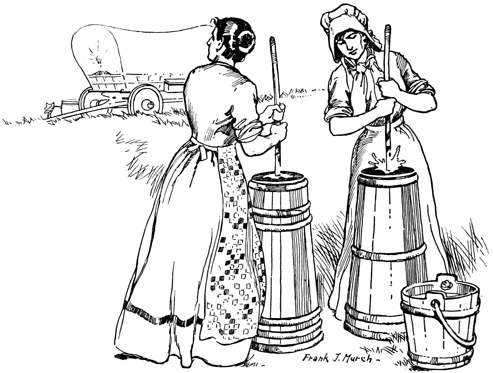
We were on reasonably high ground, or, in other words, we were not in a quagmire, and after camp had been made I counted that we would spend the following day in getting as much hickory and oak timber as we might need when we came to the mountain ranges, where axletrees, wagon tops, and even the wheels themselves, were likely to be splintered because of the roughness of the way.
Next morning while the men were hewing trees and shaping them roughly into such forms as might 71 come convenient, the women took advantage of the opportunity to churn, and at noon we had fresh butter on our bread, which was indeed a luxury.
We were yet eating slowly in order the better to enjoy the butter, when we saw in the distance, coming toward us, what appeared to be a large body of soldiers and emigrants.
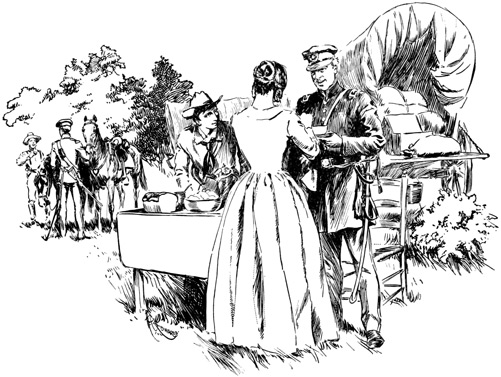
Among the foremost of the horsemen who came up and halted near us, was Colonel Stephen W. Kearny who, with three hundred dragoons, nineteen wagons drawn by mules, fifty head of cattle, and twenty-five 72 sheep, was making the first military campaign into the Far West, in order properly to impress the Indians with the strength and power of the Great Father at Washington.
Colonel Kearny would not permit his train to halt where we were encamped, but he remained with us a full half hour, taking his due share of the newly made butter, and eating heartily of our poor store.
It was a most pleasing break in the journey, and to me it was indeed something to be remembered, for never before had I seen or heard of such a number of soldiers so far away from the frontier.
When we set off again all our teamsters pressed forward eagerly, hoping to overtake the dragoons, who had already no less than two hours' start of us.
Perhaps I ought to have checked them, knowing they were forcing our stock at too rapid a pace; but yet I did not, and when next we halted thirty-two miles had been traversed since morning. This, though the way was smooth and the crossings easy, I allowed was a good day's work.
It was on the twenty-sixth day of May, after we had traveled ten miles, that we came to the bank of Little Sandy River, where was already encamped a company of emigrants bound for the Oregon country. They had thirty-two wagons, and, in addition to the 73 other stock, ninety cows, having started from Independence with a hundred.
Susan Mitchell laughed with glee when we arrived at this camp and, when I asked the reason for her high spirits, told me our people could spend the evening visiting these strangers even as they visited their neighbors at home. Indeed, I saw that all the members of the company were prinking and pluming like a party of savages making ready for a war dance.
Men whose clothing had been well-nigh in rags suddenly appeared decked out in finery, and as for the women and the girls, a garden of flowers could hardly have compared with them for variety of colors.
However, our company did not spend the evening visiting the strangers; on the contrary, they were forced to entertain others, for before supper had been cooked and eaten about three hundred Kansas Indians, men, women, and children, some walking, some riding, came into camp.
The emigrants whom our people had intended to visit were overrun even as we were, and during two hours or more the beggars remained watching for an opportunity to steal something, or striving to trade their skeleton-like ponies for our horses and mules. 74
Some of the visitors were clad in buckskin, others had leggings of elk hide, with buffalo skins over their shoulders, while many wore only greasy, ragged blankets and leggings so besmeared with blood and dirt that one could not tell what the material might be.
Many of the men had long hair, while the heads of others were shaved close to the skin, save for a tuft extending from the forehead over the crown and down to the neck, much like the comb of a rooster.
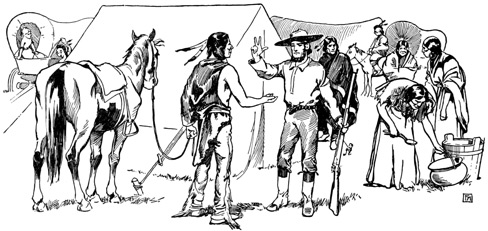
Some had their faces painted in a fanciful manner with red, while others had only their eyelids and lips colored. Again, there were those with various colored noses or ears, and I failed to see any two who were decked out, either with garments or by paint, in the same manner.
The costumes and decorations of the women were as varied as those of the men, and equally filthy. 75 All, from the smallest papoose to the oldest brave, were repulsive, at least to me, because of their uncleanliness.
How long those representatives of the Kansas tribe would have remained with us awaiting an opportunity to steal whatever they might, I cannot say; but at about eight o'clock John Mitchell urged that I drive them away, if indeed I dared. This last suggestion caused me to smile, for what fellow would not dare anything among the Kansas Indians, who know no more of courage than they do of cleanliness?
I speedily sent them out of the camp, and when, next morning, the whole tribe returned begging this or that, I threatened punishment to any who should dare linger around.
Again we had an opportunity to join forces with another company, for those emigrants whom we met at Little Sandy River were eager to journey with us, but intended to remain one full day on the bank of the stream in order to rest their stock.
I urged that we push on, lest they should travel with us whether we wished or not, and so we set off at an early hour across the prairie, arriving next day at the Republican Fork of the Blue River.
It was on the last day of May that we came to 76 where the trail turns abruptly away from the stream, stretching out twenty-five miles or more to the Platte River.
Then we advanced in wild, fertile bottoms, where wild peas abounded, and we were among the last of the oak and hickory trees that we would see for many a long day.
Here I knew we might find game, and said to those men who had been eagerly inquiring day after day as to when we would come upon buffaloes, that now was the time when they could display their skill in bringing down wild turkeys.
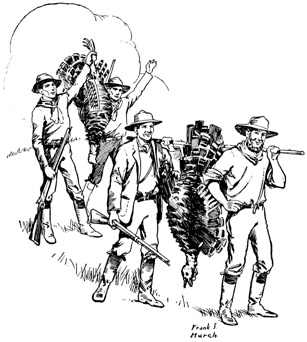
I had supposed that these people knew somewhat about hunting; but when one of the men turned upon me sharply, asking how I knew turkeys could be found near about, I nearly laughed in his face. For it seemed to me that a child should have known we were come at last to where game of some sort might be taken easily.
I had no idea of hunting turkeys, for I knew that 77 within the next few hours there should be a possibility of bringing down as many antelopes as Napoleon would be willing to carry.
Therefore I remained in camp, and saw those eager hunters striding off amid the timber, making noise enough to warn every fowl or beast of their coming.
The wonder of it was that the fellows brought in a feather; yet at night they returned triumphant and excited, with two turkeys, and one would have believed, from the way the game was displayed, that they had shown great skill.
When Susan Mitchell asked why I did not go out in search of game, I told her it was not for me to spend my time in such sport, but that before many days had passed I would show her what a hunter could and should do in this country.
It may be she thought I was boasting, and I fancied I read as much on her face; but I contented myself in silence, knowing that she soon would see what kind of hunting those, who have crossed from the Missouri River into the Oregon country twice, could do.
Next day every man and boy in our company was looking eagerly forward for signs of game, and when, the afternoon being nearly spent, they saw large herds of antelopes in the distance, it was only with 78 difficulty I could force the teamsters to remain on their wagons.
Every horseman would have set off at that time in the afternoon with weary steeds, when there was no possibility of running down the game, had it not been for John Mitchell, who, after talking with me, insisted that no man should leave the company until we had made camp.
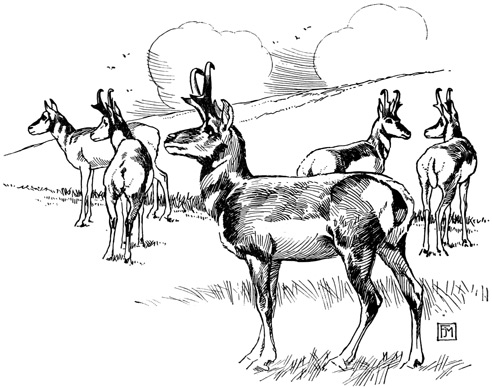
The Platte River was to be crossed before we halted, and we needed every man with us, for I knew that the bottom of the stream was soft, and the chances many that we would be forced to double up our teams.
However, we gained the opposite bank without much difficulty and were hardly more than ready to encamp, after having traveled eighteen or nineteen 79 miles, when it began to rain once more, and then the men were glad that they had not set off to hunt at nightfall.
We camped where it would be possible for us to get water without too much labor, and set about gathering fuel before everything was soaked by the rain, and darkness was upon us.
Then the men began to treat me as if I was of their own age. They came into my tent by twos and threes, asking when it would be possible for them to hunt antelopes, and when I would go with them to bring in fresh meat.
I told them that on the next day they should have all the hunting that would satisfy them and their horses, and this caused them to wonder how I knew antelopes might be near at hand.
Next morning, when we had traveled no more than six miles, any hunter could see that we were in a game country, and because our people were really in need of fresh meat, to say nothing of the desire of the men for sport, I gave the word to halt and make camp.
John Mitchell angrily demanded why I had halted the company before the forenoon was half spent.
When I told him that here was our opportunity to 80 get antelope steaks for supper, he looked at me as if he believed I was talking of something wholly beyond my knowledge. I have an idea he would have countermanded my order to form camp, insisting that we move on, had not his wife suggested that now we were so near the river, where the bank was shelving instead of steep, it would be a good time for the women to finish washing their clothing.
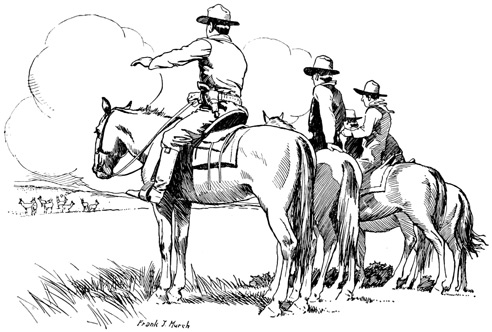
After she had spoken he said to me:—
"Very well, lad, you may show the other men your antelopes. I have no desire for a wild-goose chase across the prairie."
I gave little heed to his banter, and those who had been so eager for the hunt were right willing to follow 81 me on the chance that they might come upon something that could be killed; John Mitchell finally consented to go with us, in order, as he said, to hear what sort of excuse I would make for not finding game.
We rode straight away from the river, and within half an hour came upon a herd of from twenty to thirty antelopes feeding less than three miles away, whereupon every member of the company would have started off singly, taking the poor chances of getting a shot, had I not insisted they should hold themselves under my orders, lest there be no possibility of bringing in fresh meat that day.
"You made a good guess, lad," John Mitchell said to me, as if he was disappointed because we had brought the game to view, and I replied:—
"Any one familiar with this country may say with reasonable certainty that he will find deer in such and such a place without first having seen any signs. With buffaloes it is different. But on feeding grounds like this, one can declare positively that he will come upon some kind of deer without riding very far."
Then I gave the word for the men to divide into two parties, one going to the right and the other to the left toward the herd, in order to come up with them on both sides at the same moment, and the 82 silly animals did not note our approach until we were within half a mile.
Then they showed how rapidly they could run.
I have never seen antelopes in full flight without thinking how nearly alike they are to swallows, both for swiftness and the manner in which they bound over the ground without seeming to touch it. There are not many horses that can come up with this game once the fleet animals have been aroused; but I knew my pony could gain upon them in a chase of five miles or less, and straightway urged him on, shouting for the others to follow.
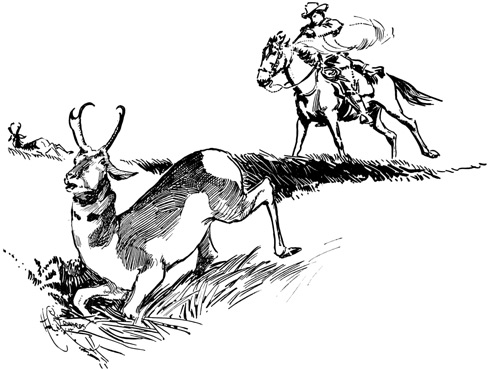
It was like horses accustomed to the plow striving to keep the pace with a blooded racer, when we struck off across the plains, and before two miles had been traversed, my companions were left so far in the rear that there was little chance they could take any part in this sport. 83
I urged Napoleon on until we were in fairly good range, when, firing rapidly, I brought two of the beautiful creatures to the ground.
There was no possibility of overtaking the herd, once having halted, so swinging the game across the saddle in front of me, I let my pony walk leisurely back to where the men waited, each of them looking with envious eyes at the result of the chase.
Within half an hour after our return to camp, five or six fires had been built, and our people were busily engaged in cooking the fresh meat, which was so welcome to them, giving little or no heed to anything save the preparations for a feast. Suddenly a single Indian of the Pawnee tribe stood before us, having ridden up without attracting the attention of any member of the company.
It was the first time such a thing had ever occurred while I was supposed to be on duty, and I said to myself that until we had come into the Oregon country and I had said good-by to these people, I should never again be caught off guard.
The Indian who had thus surprised me was as fine a specimen of a Pawnee as I have ever seen. He was tall, had a good figure, and rode a handsome pony which was really fat,—something seldom come upon, 84 for the Indians do not generally allow their horses to take on very much flesh.
He wore a calico shirt, buckskin leggings, and fancifully decorated moccasins. It would seem as if he had set himself up as a trader in footgear, for he carried with him half a dozen or more pairs of moccasins, some of them well worn, which he wanted to trade for meat.
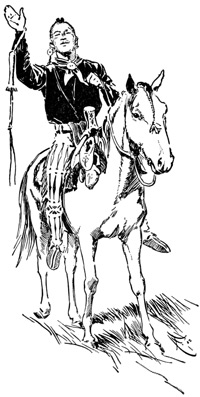
Our people were so foolish as to bargain with him, when, had they been content to wait a few days longer, until we were in a country abounding with game, they might have made any number of pairs out of fresh hides.
This fellow remained in camp after having disposed of his wares, until he had eaten three times as much as could any member of our company, going from camp fire to camp fire and gorging himself as an Indian will, until it was only with difficulty that he could mount his pony.
I felt more at ease when the fellow had left us, for I never see one of his race hanging around an encampment without good reason for believing he is trying to steal something; but the women of our company 85 were saddened because he went so soon, and I verily believe they would have served him with another feast had it been possible for him to eat more.
There was, perhaps, some petulance in my tones when I told Susan Mitchell that she need not feel badly because he had taken his departure so soon, for before arriving at the Oregon country she would come across Indians to her heart's content, and perhaps to her heart's sorrow.
I little dreamed how soon my words were to come true, although knowing that we would meet more red people than white during the remainder of the journey; but next day, when we had traveled perhaps eight miles and were halted at noon that the women might prepare dinner, our company saw Indians in a way which was, during a few moments, anything rather than pleasant.
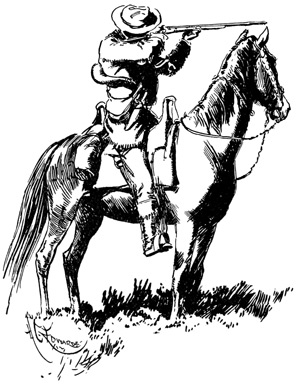
We had camped in a slight depression of the prairie, and were just about eating the noonday meal, when the distant trampling of hoofs told me that a party of some considerable size was approaching.
I had barely time to spring to my feet before twenty-three mounted Pawnees, all armed with bows and arrows, rode up over the crest of land, halting there an instant as if to measure our strength. 86
Because they were not in full paint, I understood that it was a hunting party, and therefore I gave the word for our men to arm themselves without delay, for it is true that in the wilderness one expects the savages will take advantage of any opportunity to work mischief.
John Mitchell was not disposed to obey the command, fearing lest if we made any show of warlike preparations it would only incite the Indians to anger, but, fortunately, the other men did as I told them.
Marshaling this little force, I moved out from among the wagons, bidding every fellow to stand firm, while I motioned for the savages to keep back. However, they urged their ponies on at full speed, riding toward us like fiends, and, as I knew very well, striving to throw us into a panic, in which case there is no question but that they would have plundered the camp.
Because I was the guide, it was necessary for me to take on the greater share of the danger, and, stepping 87 four or five paces in advance of my comrades, I made signs for the savages to keep away, at the same time leveling my rifle.
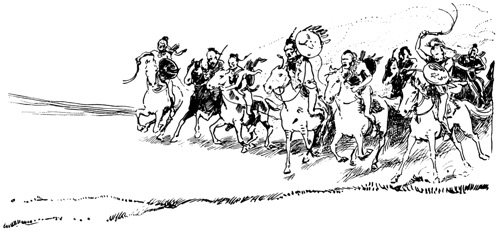
The band was coming down upon us at the full speed of their ponies, when I thus gave evidence that it was my intention to fire if they continued, and immediately the horses were checked, the band riding off toward the south, leaving the leader behind.
Dismounting, while the others wheeled about to join him again, he came toward me, his eyes roving from one member of our company to the other, as if to learn whether we had backbone enough to stand up for our rights.
He must have understood that we would put up with no foolishness, for straightway all his show of fierceness vanished. He told me that his party had 88 been out hunting buffaloes, but failed to come across any, and then begged like a dog for us to give him food.
To have admitted such a crowd into our encampment would have been giving them a license to plunder, therefore I warned the fellow off. I insisted that they go back to their village, where, beyond doubt, they would find food if they were very hungry.
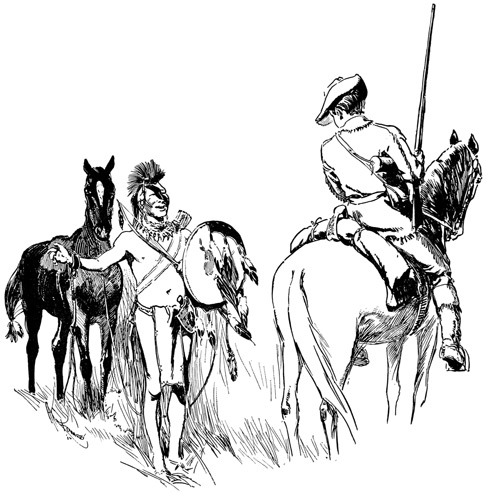
John Mitchell would have argued with me because I was turning hungry people away; but I refused to listen to him, and put on such a bold front that without further parley the leader mounted his pony, and away they went over the ridge, much to my relief. 89
When we were making camp that night a party of emigrants, numbering no less than fifty, all bound for the Oregon country, came up with us.
Instead of halting as one might have supposed, for a quiet chat, they rode on as though fearing we might want to join them, and I said to myself that their guide must be one who, like myself, had already traversed the Oregon trail; yet I was pleased because of their desire to continue on alone.
We made only twelve miles on this day, and then camped on the open prairie where we were sadly in need of fuel, being obliged to scrape up dried grass and gather even the tiniest twigs. The scarcity of fuel was no more than might have been expected, for now we were coming to that part of the country where wood was a rarity.
Next day the wind blew strong and cold from the northwest, and the cattle hurried onward in order, as it seemed, to keep up a circulation of the blood, therefore before we encamped, our party had advanced twenty miles nearer our destination; but all the men and boys were decidedly uncomfortable in body.
We had crossed five or six creeks which were no 90 more than half their usual height; but the beds of the streams were so soft that we were forced again and again to wade in that we might lay our shoulders to the wheels when the wagons were stuck fast in the mire.
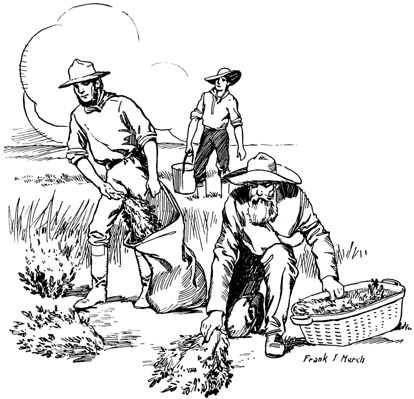
To work in water nearly above your waist for half an hour or more until having become thoroughly heated and then come out into that chilling wind, was indeed a hardship.
During the next day, which was the 7th of June, we saw the first signs of buffaloes, and then indeed our hunters were wild to go out and kill some of the huge animals, insisting that I lead the party.
Through these bottom lands, which were from two to four miles wide, there ran in every direction buffalo paths, which had been traversed so often by the animals 91 that they were no less than fifteen inches wide and four inches deep in the solid earth, and as smooth as if cut out with a spade.
Although we knew that buffaloes ranged in this region, it would indeed have been folly to set off, especially at nightfall, with the idea that we might find a herd, and so I told the eager ones, who grumbled not a little, believing I refused to lead them in the chase because of my own indolence.
When we made camp, after having traveled sixteen miles, John Mitchell called my attention to the fact that our oxen were growing lame, and he seemed quite vexed because I treated it as a matter of course.
Any one who has traveled from the Missouri River to the Oregon country, knows that while crossing the prairies, which are covered with a dry stubble of matted grass, the hoofs of the animals will become hard and crack, thus allowing dirt to collect in the crevices until the leg above the hoof swells, and sometimes festers.
There is only one way to treat this trouble, which is to wash thoroughly in water made very strong with soap, and then scrape away all the diseased part of the hoof, after which tar, or hot pitch, should be applied freely. 92
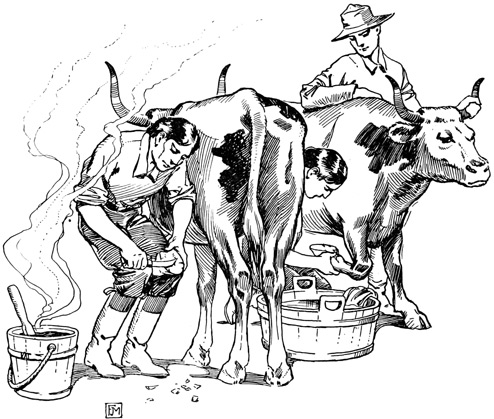
Our men should have looked after the feet of the animals, but perhaps because that required too much labor, they had allowed the poor beasts to go neglected, and now had come the time when, unless they set about it manfully, our journey to the Oregon country might be ended suddenly.
That evening, while every man was working for the relief of the oxen, three companies of emigrants, one after another, came up and encamped within half a 93 mile of us, until we had close under our eyes, belonging to these strangers, more than a hundred wagons.
There were in the first company fifty-two wagons, each drawn by four yoke of cattle; the smallest company had thirteen wagons in its train, therefore you can understand that we were almost an army.
Now John Mitchell and Susan understood why I had protested against joining forces with any of the companies we came across, for at this place the grass was scanty indeed, with many animals to feed upon it, and we had the greatest difficulty to find for our beasts as much food as they were needing.
I insisted on pulling out at an early hour next morning, in order to get ahead of this army of emigrants, and we traveled all day without finding better food for the cattle, encamping at night, after having journeyed twelve miles, with the knowledge that every beast we owned was sadly in need of something to eat.
One train of the emigrants which we had left behind, numbering forty-three wagons, came within sight of our camp that night just at sunset and, finding the grass poor where we had halted, continued on; but I knew full well there were not hours enough of daylight remaining for them to find better pasturage.
When another day dawned the rain was falling heavily, and even John Mitchell proposed that we 94 remain in camp, rather than attempt to push on; but when I reminded him that the oxen and cows were straying here and there, striving eagerly to pick up a few scanty blades of grass, he held his peace.
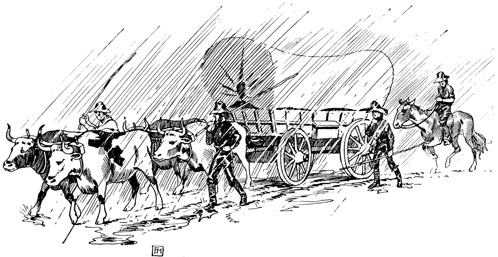
We continued the journey while floods of water came down from the clouds, until before we were half an hour on the way every one, save the women and children, who were protected by the wagon covers, was drenched.
After traveling fifteen miles, we encamped where the ground was so sodden that our feet sank into the soil two inches or more; however, we gained such shelter as we could under the wagon bodies or beneath the wagon coverings, striving to sleep while the wind drove the rain in upon us like a shower bath.
We could not well put up the tents in such mire, and it was more comfortable pacing to and fro as if doing sentry duty, than lying at full length in a veritable swamp. 95
Again we set out with the rain coming down as if it would never cease, passing village after village of prairie dogs; but the children and the women showed no desire to spend any time looking at them, for all our company were in such discomfort that it would have needed something more than an ordinary animal to entice them out of their way a dozen paces.
Not until we arrived at the lower crossing of the Platte River did the storm of rain subside, and while we were striving to get the wagons across, the sun came out with full strength, making matters quite as uncomfortable for us who labored, as when the torrents of water were pouring down upon our bodies.
At this crossing the water was from one to three feet deep and the bed of the river sandy, therefore in order to get our wagons over it was necessary to double up the teams, and in some cases put on twelve or fourteen yoke of oxen, all of which required considerable time.
When we were on the other side of the river, and our men so weary that they spent but little time making camp, in order the sooner to throw themselves down to rest, I aroused them to the highest pitch of excitement by announcing that now we were in a buffalo country, and that before many hours had 96 passed they should have as many short ribs, humps, and tongues for roasting as could be eaten at one meal, however hungry they were.
As if some magic change had been wrought, every man sprang to his feet, insisting that we go at once in search of the game; but I held firm, claiming that the horses were far too weary to take part in a hunt.
Before the next day had fully dawned, the men who were standing guard aroused the camp by shouting excitedly that we were surrounded by buffaloes.
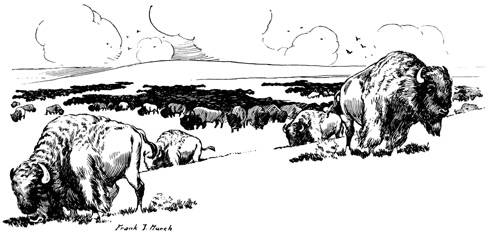
It was not a very great surprise to me that the huge beasts should come so near the camp, for I had heard from men who traveled over the Santa Fe trail that the buffaloes would often mingle with straggling cows, and more than once had emigrants lost their live stock by having the animals literally forced away by these big brutes. 97
It was a difficult matter to restrain the hunters who were bent on starting off on the instant, believing they could kill a buffalo with but little effort, if one came within range.
To bring a buffalo down, one must shoot him in the lungs. To hit the skull is much like sending a bullet against a rock, for it has no other effect than to excite the animal, and oftentimes even then not very much. Of course if a hunter can send a ball through the brute's heart, that settles the matter, but it is a difficult shot.
I did my best to explain how they ought to shoot in order to kill, and then, finding they were not inclined to heed my words, I proposed that we set off, each going his own way and doing the work after his own fashion.
It caused me to smile when I saw those men creeping up on some old bull, whose flesh was so dry and tough that none save a starving man would eat it; but they seemed to think it was size that counted.
Knowing that now was the time when I could again profit by my experience as a hunter and trapper, I went off in chase of a couple of young cows, and within thirty minutes had them stretched out on the prairie. Meanwhile I believe that no less than a hundred shots 98 had been fired by the other members of the company; but I failed to see that any of them had been successful.
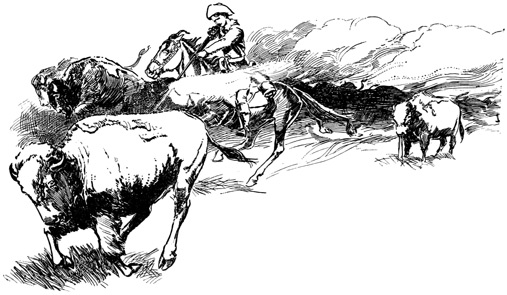
John Mitchell and one of the men who went out with him succeeded in killing an old bull, and although during three hours of that forenoon there were hundreds of buffaloes in sight, all our company took from that vast herd were the two cows I had killed and the tough old fellow that had fallen under John Mitchell's rifle.
Because Susan's father did not call upon me for advice as to how his share of the game should be cut up ready for cooking, I held my peace, but set about taking the flesh from each side of the spine, from the shoulders to the rump, of the two animals I had killed. Afterward I cut out the tongue and the hump ribs, while those two men were hacking at their game, apparently believing his flesh should be treated after the same manner as that of a stall-fed ox. 99
While I was making ready some of the hump ribs for roasting, my mother came to my side, saying, as she pointed to our companions:—
"It pains me to see these people heedless of that which they must meet with before we can arrive at the Oregon country. They who complain bitterly because the sun falls upon them too warmly, or that the ford is very deep, hope to make their way to that far-off land with no more labor and no more suffering than they have already experienced since we left Independence."
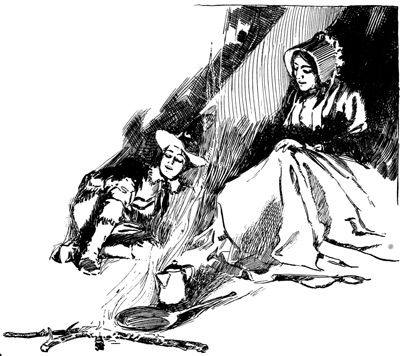
"They will soon learn, mother," I said laughingly, and yet in my heart was sorrow for the people whom I had so lately come to know, because of the lesson that was before them. "The one fear is that when we come to the mountains, when we must fight with all our strength to gain a half mile in this direction 100 or a mile in that, camping without food and without fuel, whether they will keep on or grow disheartened and turn back."
"I cannot understand, my son, that you need feel anxious. Do your duty by them as you have agreed, and even though we are forced to come straight away back over the trail, it will be through no fault of yours."
I have allowed myself to set down details concerning this journey of ours into the Oregon country as if there was ample time at my disposal; yet if I am to tell all the story of that long tramp, and then attend to the work which I have taken upon myself, it is necessary I hasten in the recital, instead of striving to give the particulars of each day's march.
After leaving the camp where we had killed the buffaloes, we found the traveling good, grass plenty, and game so abundant that one might go out and shoot whatever he needed of buffaloes, antelopes, or elks, without spending very much time at the work, providing he was reasonably expert with his rifle.
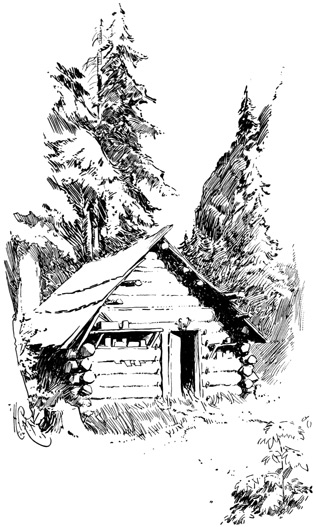
Susan rode with me, as she had from the beginning of the journey. Nothing of note happened to us, unless I should set down that this day was stormy, and on that day the sun shone, until we came into 101 the valley of the North Fork of the Platte, through a pass which is known as Ash Hollow.
There we drove down a dry ravine on our winding way to the river bottoms, stopping now and then to gather a store of wild currants and gooseberries which grew in abundance.
Near the mouth of the ravine we came upon a small log cabin, which had evidently been built by trappers, but the emigrants on their way into the Oregon country had converted it into a post office, by sticking here and there, in the crevices of the logs, letters to be forwarded to their friends in the States. Hung on the wall where all might see it, was a general notice requesting any who passed on their way to the Missouri River to take these missives, and deposit them in the nearest regular post office. 102
The little cabin had an odd appearance, and Susan confessed that, almost for the first time since leaving Independence, she was growing homesick, solely because of seeing this queer post office.
After crossing the stream we came upon a party of emigrants from Ohio, having only four wagons drawn by ten yoke of oxen, and driving six cows.
Truly it was a small company to set out on so long a march, and when the leader begged that they be allowed to join us, I could not object, understanding that unless the strangers had some one of experience to guide them, the chances were strongly against their arriving at the Columbia River.
There was in the company a girl of about Susan's age, whose name was Mary Parker, and from that time I had two companions as I rode in advance of the train.
I could have found no fault with these new members of our company, for they obeyed my orders without question from the oldest man to the youngest child.
Mary Parker was a companionable girl, and she and Susan often cheered me on the long way, for even when the rain was coming down in torrents, drenching them to the skin, they rode by my side, laughing and singing. 103
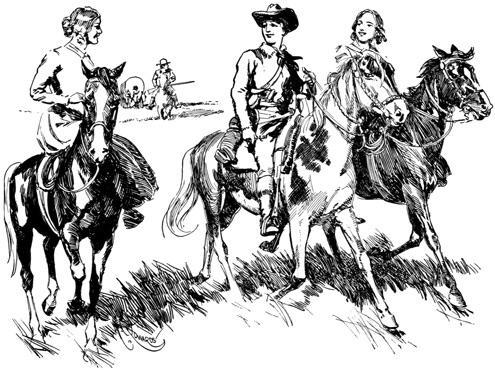
On the twenty-fourth day of June we arrived at Fort Laramie, in the midst of a heavy storm of rain, thunder, and lightning. We had traveled six hundred sixty-seven miles since leaving Independence, if our course had been the most direct; but allowing for the distances some of us had ridden in search of cattle or here and there off the trail looking for a camping place it must have been that we made at least a hundred miles more.
Fort Laramie is on the west side of a stream known as Laramie's Fork and about two miles from the 104 Platte River. It is a trading post belonging to the North American Fur Company, and built of adobe, by which I mean sun dried bricks, with walls not less than two feet thick and twelve or fourteen feet high, the tops being well guarded by long, sharp spikes to prevent an enemy from climbing over.
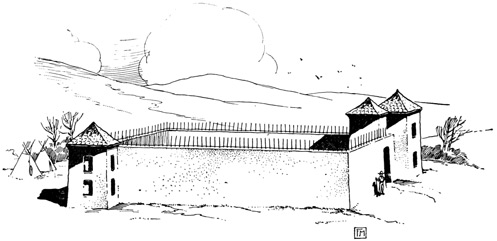
This fort, if it can be called such, is simply a wall inclosing an open square of twenty-five yards each way, along the sides of which are the dwellings, storerooms, blacksmith shops, carpenter shops, and offices all fronting inside, while from the outside can be seen only two gates, one of which faces the north and the other the south.
Just south of the fort is a wall inclosing about an acre of land, which is used as a stable or corral, while a short distance farther on is a cultivated field, the scanty crops of which give good evidence that the soil is not suitable for farming. 105
About a mile below Fort Laramie, and having much the same appearance as that fortification, although not so large, is Fort John, which is in possession of the St. Louis Fur Company.
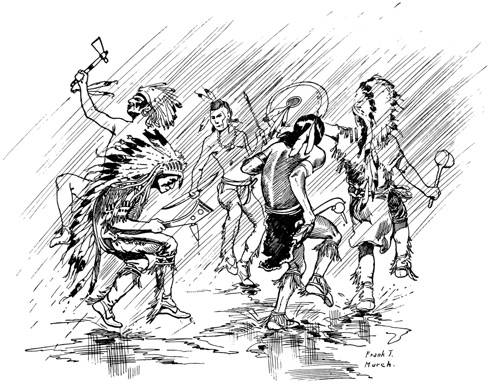
We were given quarters inside Fort Laramie, which was much to our liking, for it would have been more than disagreeable had we been forced to camp outside the walls, where were, when we arrived, at least three thousand Sioux Indians. Their buffalo-skin lodges dotted the plain all around the fort until one could have well fancied there were three times the real number in the neighborhood, and it was as if 106 their tepees were countless, although John Mitchell was told that they had no more than six hundred.
I learned shortly after our arrival that the Sioux had gathered here for the purpose of making ready to attack the tribes of the Snakes and Crows, and they had but just finished their war dance when we came up, seemingly having no regard for the violent storm which was raging.
Even as we drove into the fort the water was descending from the clouds in torrents, but there were hundreds of these savages dancing and singing, and in various ways striving to show their joy because a war was about to be begun against their enemies.
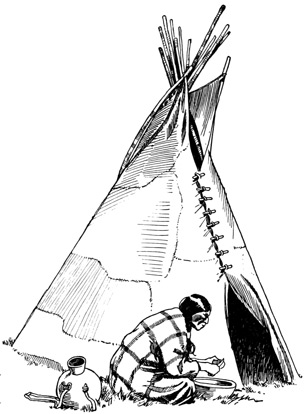
A Sioux lodge is made of poles lightly stuck into the ground, in a circle of about ten feet in diameter; the tops come together within less than twelve inches, this opening being left for the smoke to pass out, because in stormy weather the Sioux women do all their cooking under cover, when a fire is built in the center of the tepee. Herein they differ considerably from the Pawnees, who seem to think it disgraceful to seek shelter, save in the most bitter weather of winter.
Over the framework of poles are buffalo robes, tied together with sinews until the covering will shed 107 water and resist wind. Inside, the floor is covered thickly with skins of many kinds, on which by day the occupants lounge or cook, play or gamble, as best suits their fancy, and at night the same furs serve as a bed for all the family.
It was at Fort Laramie that I was met by certain members of the American Fur Company, who had in the older days been well acquainted with my father, and had seen me more than once when I was with him.
They paid their respects to my mother, and she and I, in company with John Mitchell and Susan, were invited to dinner with the gentlemen. We had cold corned beef and biscuit, with plenty of milk to drink, which fare was to us a luxury.
We remained at Fort Laramie one day and had the good fortune to see the Indians setting out on 108 the march, the men to go against their enemies, and the women to return to the villages.
We saw the squaws taking down the lodges and fastening the poles on either side of the pack animals, with one end dragging on the ground. Across these poles, just behind the horse, were lashed short pieces of wood, forming a framework on which were tied the food, furs, and household belongings, while in many cases the children rode on top of the load during the journey.
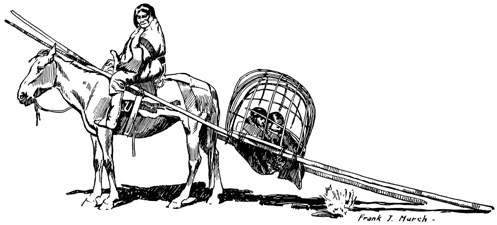
Then the babies were shut up in small willow cages, and either fastened on the backs of the pack horses, or securely tied to the trailing poles.
The women performed all the work from taking down the lodges to leading the pack animals. The men did nothing save sit on their ponies, decked out in a fanciful array of feathers, with their war shields and spears from which fluttered gay-colored bits of cloth, as if their only purpose in life was to present a warlike appearance.
As I told the girls, those Sioux Indians making 109 ready for battle were the first real savages we had met. They would not hesitate to carry away anything belonging to a white man, if they could get their hands upon it, but they acted more like men, than did any we had seen before.
Within two days after leaving Fort Laramie, we killed three elks and four deer. It was necessary to halt another day in order to cure the meat, after which we pushed on at our best speed until the Fourth of July, when all the company, John Mitchell's following as well as that party of emigrants who joined us at Ash Hollow, remained in camp during a full day to celebrate properly the winning of our independence.
There was nothing we could do, save follow the example of the savages, when they want to show signs of rejoicing, and that was to make a great feast.
I had the good fortune to shoot an elk and an antelope shortly after daybreak that morning, and much to my surprise John Mitchell and one of the men brought in a small bear.
During the feast those men who believed they excelled in speech making showed their skill at great length. The chief part of what was said concerned the Oregon country and the possibility that the Government at Washington would stretch out its arms 110 over the land to which we were traveling, showing the English people that we claimed it as our own, and intended to hold it against all comers.
This halting for the celebration was of advantage to the cattle, whose feet were yet sore, for they needed rest quite as much as did the women of the company.
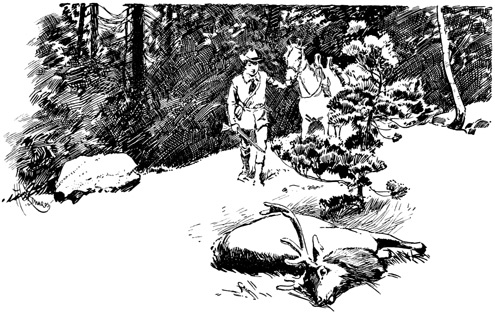
Then, when we set off once more, it was with greater cheerfulness and increased hope, for the way could not have been improved nor made more pleasant. There was timber in abundance, so we were not put to it for fuel, and as for game, a good hunter might go out at almost any hour in the day two or three miles from our wagon train, and bring back deer, buffaloes, antelopes, or even bears. 111
Ten days after we celebrated the independence of this country we encamped near the Narrows, within sight of the snow-capped Wind River Mountains, and then it was that our company got some idea of what a herd of buffaloes looked like.
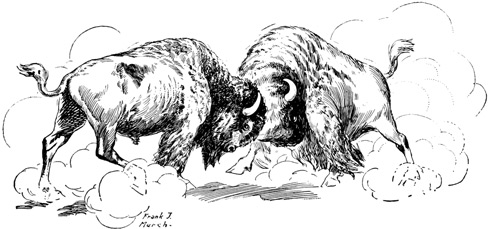
When we broke camp in the morning it seemed as if the entire land was covered with the animals. They were in such throngs that the sound of their hoofs was like the rumbling of distant thunder, and one could hear the click, click, clicking of the thousands upon thousands of horns when they came together in battle, for the bulls appeared to be fighting incessantly as they moved here and there.
Some of the brutes were rolling in the dust, turning from side to side as if in greatest delight, others had gathered in groups as if watching those who fought. 112 One could compare the scene to nothing more than to an ocean of dark water surrounding us on every side, pitching and tossing as if under the influence of a strong wind.
It was such a sight as I had seen more than once, but to my companions it was terrifying at the same time that it commanded their closest attention.
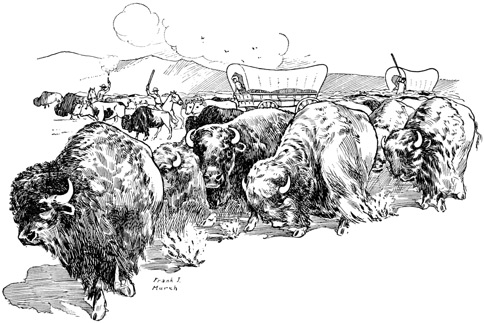
The big brutes were in such numbers that they gave no heed to us. Had we been needing meat, hundreds upon hundreds might have been brought down within a mile of the encampment. As it was, four of our men could not resist the temptation to go out and kill some, although it was wanton butchery, for we had then so much flesh in camp that more could not be carried.
I was a little anxious on beginning the day's march, fearing lest we might find ourselves in the midst of 113 that herd, for they gave no attention to man even when our people were shooting.
But it was not for us to halt because of a lot of stupid buffaloes, and I gave the word to move on, insisting that all the men, being fully armed, should guard the cows lest they be stampeded.
For two hours we rode in the very midst of that countless herd, with the shaggy, heavy brutes pressing so close to our wagons that some of the men were forced to go on ahead and drive them away by firing pistols or using clubs, for one could get near enough to pommel them as you might pommel a lazy horse.
I did not breathe freely until past noon, and then we had left behind us that surging sea of beasts.
But for the fact that the time would come, as I knew full well, when we should need meat, I would have said I hoped we should never see another buffalo that side of the mountains.
On this night, within about a dozen miles of the Narrows, we came upon Colonel Kearny's soldiers, returning from their long march, having come through South Pass. Somewhat of the hardships they had encountered, and which we must face, could be guessed at by looking at those seasoned troopers, who appeared 114 to be completely exhausted by long riding and scanty rations.
No less than twenty of the men were on the sick list, and at least a hundred others looked as if they soon would be.
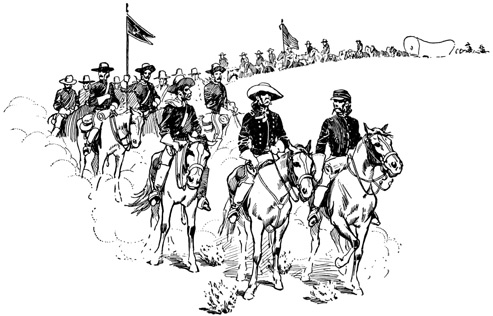
I believe nothing could have been shown John Mitchell's company which would have told more eloquently of the hardships to be encountered when we came among the foothills.
Then we pushed onward more sturdily, and I could see that every man in our company was looking forward into the future, understanding that there must be no faltering now, else they would fall by the wayside, as had so many of whom we heard from day to day. 115
On the seventeenth day of July we felt the first frost of the season, when ice formed a quarter of an inch thick, and this warned our people that there was no time to be lost, if we would win our way through. If winter caught us while we were among the mountains, it would be necessary to make camp until spring, and who could say whether during those long months we would be able to get sufficient game to keep us alive?
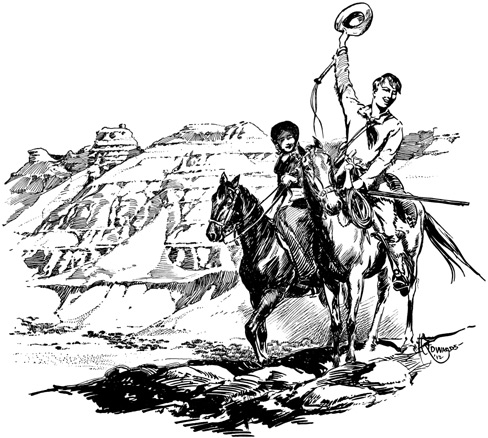
Two days after we had this first token that winter was coming, we passed over the dividing ridge which separates the waters flowing into the Atlantic from those which find their way 116 into the Pacific Ocean, and, bringing the train to a stop before any of our people realized that we had arrived at what one might call the parting of the ways, I called out that three cheers be given for the Oregon country, at the same time pointing to the streams which were running westward.
There was great excitement in our company when it was known that we were really on the Divide, and regardless of the fact that we should have been pushing on, all insisted upon halting until late in the afternoon, in order, as Mary Parker said, that they might celebrate properly having accomplished thus much of the journey.
That night the air was filled with frost, and we who had been sleeping with no blankets over us, were glad to wrap ourselves in whatsoever we could lay hands upon, to prevent our blood from being chilled.
When we camped, there was no water to be seen on either hand, nothing save the sandy bed of the stream, and I verily believe all our people would have gone thirsty if I had not insisted that they dig in the sand a hole from eighteen to twenty inches in depth.
We then watched until enough brackish water had oozed up to moisten the tongues of our thirsty stock, after which, by waiting a full hour we got enough to satisfy us partly.
It was the twenty-fifth day of July when we halted 117 at Fort Bridger and set up our tents just outside the adobe walls, for, knowing the place right well, I had no desire to spend a night inside the inclosure.
This fort, like many another, is little more than a trading post, and was built two years before we started for the Oregon country, by two old trappers who had turned fur traders. The largest building is made of adobes and serves as storehouse, while the others are flimsy shelters built from time to time to serve the needs of visitors.
I remember having heard in St. Louis why James Bridger forsook his calling of trapper to engage as trader, and have even seen the letter he wrote Pierre Chouteau when he settled in the valley of Black's Fork of the Green River, asking that goods for trading with the Indians be sent to him.
In it he wrote: "I have established a small fort with a blacksmith shop and a supply of iron, on the road of the emigrants, which promises fairly. People coming from the East are generally well supplied with money, but by the time they get here are in want of all kinds of supplies. Horses, provisions, and smith work bring ready cash from them, and should I receive the goods hereby ordered will do a considerable business with them. The same establishment trades 118 with the Indians in the neighborhood, who have mostly a good number of beaver among them."
John Mitchell had a very good idea of how great a profit the owners of the fort hoped to make, when he was forced to pay five cents a pound for flour, and three dollars a pound for powder, with other supplies in like proportion.
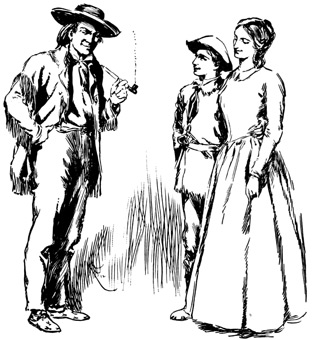
James Bridger was exceedingly kind to mother and me when he learned who we were, for he had often trapped in company with my father, and I believe he would have given us outright anything we might have needed from his stores, had we told him we lacked money with which to pay for what was wanted; but I would not have taken a dollar's worth from any man, unless my mother had been in sore distress.
Susan Mitchell was greatly interested in the trapper who had turned trader, when she heard from my mother that James Bridger had been grievously wounded in a battle with the Blackfeet Indians, 119 had received two arrows through his back, and yet after so severe an injury he, with his friend, Bascus, and two other comrades, held the savages at bay for two days, until a company of white hunters came to his relief.
One of the arrows was taken from Bridger's body during the fight, but the other held firm in the wound, and Bascus cut off the wooden portion close to the flesh, letting the iron head remain. This piece of metal he carried in his body three years, until Dr. Marcus Whitman, who was on his way to the Oregon country, cut it out after long and painful work. The arrowhead was three inches long, and the barbs had become hooked around one of the man's bones, which held it until it was cut out by Dr. Whitman.
We were at our nearest point to the Great Salt Lake, and at this place a trail branched off, leading to what is known as Ogden's Hole, close by that vast inland sea. If we had desired to go to the California country, it would only have been necessary to continue on around the Wasatch Mountains, and then strike off again to the westward, unless we were inclined to climb the hills, going by the way of that salt lake.
There were twenty-five lodges of Indians near Fort Bridger, some of the savages having come to trade, and not a few of them being employed as trappers by the 120 fur buyers. They were mostly of the Snake tribe and had with them quite a large herd of cattle.
Already Susan Mitchell and Mary Parker had seen enough of the Indians to satisfy their curiosity, and whether they wore moccasins of a little different pattern from other Indians, or fashioned their bows and arrows after another manner, was not sufficient inducement to persuade them to encounter such conditions as were to be found in the lodges.
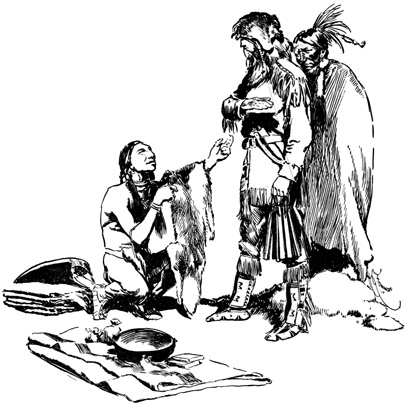
In order to give our cattle a rest we remained at Fort Bridger two days, after which we went on again with the hope of soon coming upon the Columbia River.
Our men had been told by the fur buyers that it was of the greatest importance we push forward at all speed, lest we be caught among the hills by the snow, and during the four or five days following our departure from the post, we traveled more 121 rapidly than at any other time since leaving Independence.
The month of August had well set in when we came to Soda Springs, and there it was I had counted upon surprising Susan Mitchell; nor was I disappointed.
These springs are small hills or mounds standing at the right of the trail near a grove of cedars and 122 pines, while the water that has oozed out of them in the past has formed a solid crust of soda for miles around, so hard that one may walk upon it.
The liquid soda is warm and sparkling as it comes to the surface, and when it has been led some distance away where it may be cooled, is as pleasing a drink as one can find in any of the shops in the East, for it is the true soda water as made by God Himself.
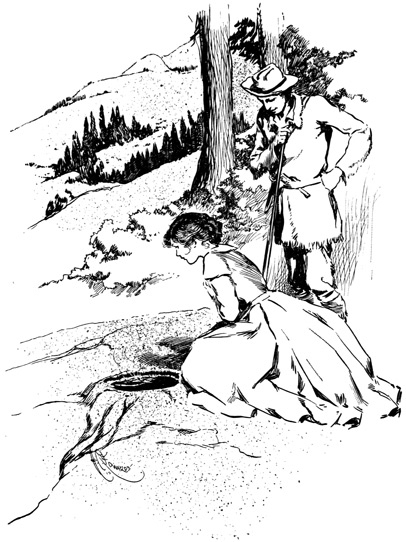
At the end of the first week in August we arrived early one forenoon, at Fort Hall, which is a trading post belonging to the Hudson's Bay Company and having the appearance of a regular fortification, because of being built chiefly of adobe brick.
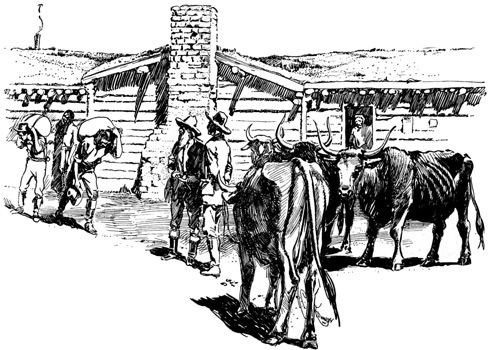
There we were able to buy flour at two cents a pound, providing we were willing to pay 123 for it in cattle at the rate of from five to twelve dollars per head, and since we had two lame oxen and three cows that could travel but little farther, we laid in a supply, being allowed for our five animals thirty-six dollars in goods.
At this place John Mitchell's people were urged to abandon the idea of going into the Oregon country because of the hardships and dangers which must be encountered, and those trappers who were lounging about the fort insisted that it would be better that we went to California, instead of attempting to go farther on the road we had chosen.
The emigrants who had joined us on the way became frightened because of the many stories which were told, and decided to try their fortunes in California rather than Oregon. Therefore when we pulled out from Fort Hall, Susan Mitchell was saddened at parting with Mary Parker, who had been a cheery comrade for the girl during the time they had traveled together.
We were now in the country of the Snake Indians, and while one might believe that the Pawnees are the most expert thieves in the world, he has simply to come across the Snake tribe in order to learn what may be done in the way of robbery.
Two days after we left Fort Hall, when I had warned 124 John Mitchell that it was necessary to keep a sharp watch both day and night lest even the clothing be stolen from our backs, he laughed me to scorn; but I noticed that he took exceedingly good care of his saddle horse, not only hobbling the animal, but tying him to a picket rope which was fastened to his own wrist.
This he did twice, and yet on the third morning, despite all such precautions, the horse was gone, the hobble having been cut and left on the ground, while the picket rope was severed neatly within a half dozen inches of his hand.
This theft had been committed while Mr. Mitchell slept, and he prided himself upon being one who was easily aroused. After this, and I may as well say here that John Mitchell never saw his horse again, there was no reason why I should urge watchfulness upon any of our people. They voluntarily redoubled the guards while we were in the Snake country, and although I am not able to say we got through without losing anything, nothing of great value was taken from us, with the exception of the horse.
I had one more marvel on this road to the Oregon country with which to surprise Susan Mitchell, and that was the Hot Springs, which were within a mile 125 of the trail; therefore I led the company directly to them, there making camp.
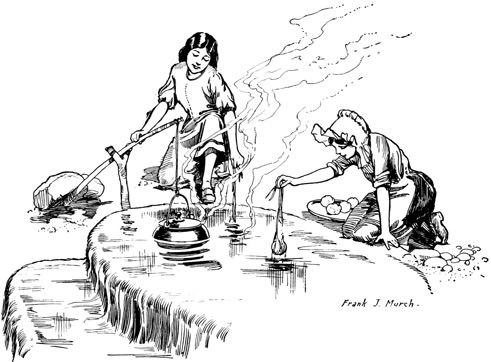
There are five or six of these springs, from which water bubbles up so hot that one may boil meat in it without need of fire, and when I said as much to Susan's mother, she was inclined to think I would make sport of her; therefore she boldly plunged her hand in, with the result that every part of the skin which came in contact with the water was reddened to the point of being blistered.
That night we boiled some pemmican[1] in one of the springs, and the girls of the party amused themselves by making up balls of meal dough and lowering them into the water by strands of plaited grass, cooking them as dumplings are cooked in a stew of meat.
When we camped at Portneuf Crossing, mother told us the story of the trapper Portneuf, who was murdered at this place by the Indians, and spoke in such a tragic manner that even John Mitchell was impressed by the brutal details. When I made the rounds of the camp before going to sleep, I took note that none of the men were inclined to move around alone outside the rays of light cast by the camp fires, and he whose turn it was to stand watch, had with him a companion, much as though he was afraid to remain without a comrade near at hand in a place where such an evil deed had been done.
[1]A prepared meat carried by all travelers over the Oregon trail.
Next day, after a march of fourteen miles, we came to the American Falls of the Snake River, and supper was long delayed because all the women and girls were lost in wonder and surprise at the beautiful scene. I told them that the Snake River flows over three immense cataracts, the American, the Shoshone, and Salmon Falls, one quite as awe-inspiring as the other.
We slept that night with the roaring of the cataract drowning all other noises, and next morning we were as wet as if we had been exposed to a smart shower. The wind had changed about midnight, and the spray from the falls was blown into the tents as well as 127 under the wagon covers, until we were so uncomfortable that sleep left us at an early hour.
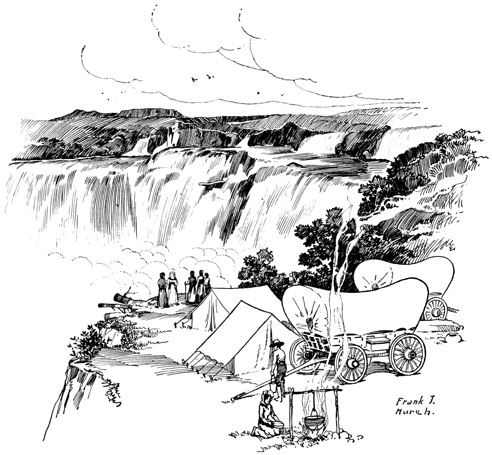
Because of thus being awakened before break of day, we set off on the march sooner than usual, with the result that before sunset we had arrived at Raft River, twenty-six long miles from the American falls. The trail was difficult even for pack horses, and there were many places where it seemed an absolute impossibility to drag the heavy wagons with the teams doubled until we had at times as many as twelve yoke of cattle to one cart. 128
We were encamped in a valley, the bottom lands of which were covered with heavy, rich grass that must have been a real surprise to the animals after the scanty fare they had had from the time of leaving Fort Bridger. I believed that we might spend a full day here, in order to give the animals good rest before undertaking the mountainous trail, and was on the point of telling John Mitchell what I had in mind when Susan called my attention to six or eight wreaths of smoke coming from as many different points on the mountains around us.
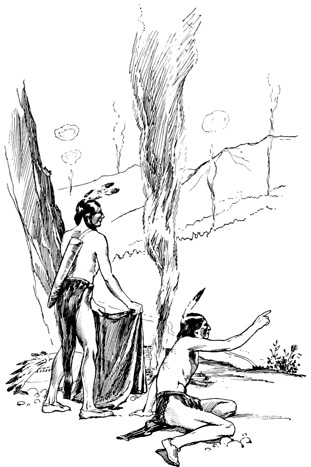
To the girl it was a cause only for surprise that smoke should be seen ascending in such a place; but on the instant I was alarmed, knowing beyond doubt that signal fires had been kindled by the Indians, warning others of their tribe that a small company of white people were where they might be attacked with small chance of defending themselves.
No one except my mother knew of the anxiety which filled my heart that night. Knowing that we were at the mercy of the savages, if they should fall upon us while we were in the valley and they on the rising ground around us, I could not sleep, although needing rest sadly. I spent the time until sunrise walking from one sentinel to another 129 in order to make certain each man was keeping sharp watch.
John Mitchell must have guessed that danger threatened, for he came out from beneath the cover of his wagon shortly after midnight and remained on the alert until sunrise.
Then we could see many columns of smoke from the sides of the mountains, and I knew we were surrounded by savages who would not hesitate to make an attack in order to gain possession of our goods, if it could be done without great danger to themselves.
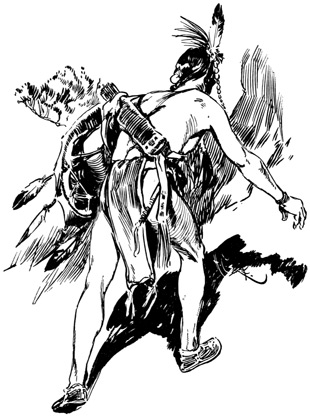
I would not listen to John Mitchell when he proposed that we make a hurried start, for I knew the Indians were near enough to see clearly what we were doing, and at the first show of fear on our part the 130 whole crew would be upon us. However, I insisted that no member of the company should stray ever so short a distance from the train, and I took good care that the cows were herded in close order between two of the wagons.
Despite all I could say to the contrary, Susan insisted on accompanying me when I rode to and fro along the line, keeping sharp watch for a possible ambush and fearing each instant to hear that savage yell which would tell that the enemy was upon us.
Yet we passed along the mountain sides and across narrow valleys in peace until after sixteen miles we arrived at the banks of Marsh Creek, where I gave the word that a halt be made, because then we were where it would be possible to make some show of defending ourselves in event of an attack, owing to a small thicket of stunted pines on a slight elevation of land near the water.
During all the day's journey, I knew the Indians were hovering close around us, because of the signal fires that were lighted just in advance of us from time to time; but we failed to see the enemy except once, when a half-naked savage showed himself, as if by accident, as we rounded a bend in the trail. Other than that one glimpse of a dark form and the signal fires on every hand, we had no proof that danger lurked near us. It is likely that the greater number 131 of our company were ignorant of that which menaced; but I knew full well that we had been in peril of our lives from the moment we made camp at Raft River.
Again I passed a sleepless night, and again John Mitchell joined me as I went from sentinel to sentinel, asking now and then if any suspicious noise had been heard, until another day had dawned, and then I failed to see signal smoke, search the country with my eyes though I did. It was evident the Snakes believed we would put up a strong fight if attacked, and, failing to catch us at a disadvantage, they had drawn off, most likely hoping to come across some other company of emigrants who were not so cautious.
From Marsh Creek we journeyed to Goose Creek, a distance of seventeen miles, earning by most severe labor every yard of advance and failing to find water 132 during the entire day. That part of the country yielded no grass for the animals, and when we made camp at night we took good care to see that every beast was hobbled so securely that he could not stray very far in search of food.
The next day's march ended at Rock Creek, and although the traveling was quite as hard for beasts and men, we made twenty-four miles, urged to most severe exertions because our store of food was being consumed rapidly. I knew we could not hope to find game and therefore we must go hungry until arriving at the trading post on the Snake River known as Fort Boise, while the animals would have great difficulty in finding grass. The country was stripped as bare of green as though a fire had passed over it, and many were the distressing tales I could have told of emigrants who had perished miserably by starvation while trying to make this portion of the long journey.
We left Rock Creek a full hour before daylight, urging the famished beasts at their best pace while we ourselves strove not to think of food lest the hunger which beset us should become more keen. Not until forty-two miles had been traversed did I give the word to encamp, and it was full time, for I question if we could have held on half an hour longer. 133
Then we had arrived at Salmon Falls Creek. It was nearly nine o'clock in the evening when we came to a halt, and during the last half hour of the march we had been more nearly asleep than awake. At this camp we found a scanty crop of grass, but no food for ourselves, and when, weary to the verge of exhaustion, we crept under such shelters as had been put up hurriedly in the darkness, it was with the knowledge that sleep would come quickly, enabling us to forget, even for a short time, our great needs.
From this point the next camping place would be on the bank of the Snake River, at what is known as the first crossing, twenty-five miles away, and then we had before us a journey of seventy-three miles to the Boise River, after which we must march forty-eight miles farther in order to gain Fort Boise, where food could be had.
One hundred forty-six miles stretched out ahead of us before it would be possible to satisfy our hunger, and this distance could not be covered in less than three days. Our animals were so nearly worn out with severe work and lack of food that it did not seem possible we could advance another ten miles, and yet all that long distance must be traversed unless we gave up the struggle, leaving our bones 134 to bleach on the trail, as many another had done before us.
Now and again we came upon ghastly evidences of death, in wrecks of wagons and tokens of human beings who had perished by starvation. Perhaps it was well we saw those things, since they forced our people to struggle all the harder.
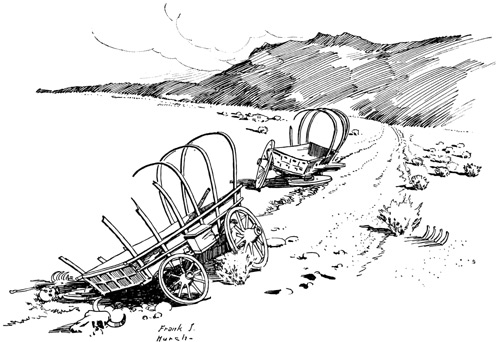
We traveled in silence during the three days before arriving at Fort Boise, eating nothing at noon, and for breakfast and supper receiving no more than enough to prove how desperately hungry we were. I strove to keep my mind fixed upon the danger which might menace from Indians, in order to be ready to guard against it; but the others, even including 135 Susan, rode or walked listlessly, as if already despairing of ever being able to accomplish the task before us.
The animals moved feebly; twice an ox fell in the yoke, refusing to rise again, and we were forced to leave him behind. The men worked half-heartedly when it became necessary to double the teams in order to haul the wagons over the rough road, and so great became the suffering of all that we moved onward as if in a dream.
I shall not speak of that terrible time, save to say that the good God permitted us to arrive finally at Fort Boise at the very moment when I believed there was no hope of our succeeding. It was as if we had been dead and come alive again, when the trappers came out to meet us, and carried the women and children into the inclosure, for, having arrived where grass could be found, the hungry beasts came to a full stop nearly a quarter mile distant, nor was it possible to force them forward a single pace farther.
Fort Boise is a Hudson's Bay Company's post, and if the trappers and traders there had been members of the American Company they could not have treated us with greater kindness. Because of our 136 exhausted condition the men took entire charge of our cattle, and we were treated almost as children, being waited upon during the first hours after our arrival as if we were not capable of caring for ourselves, which I suppose really was the case, for if we had been allowed to have all the food we desired some of the weaker ones might have eaten until they died.
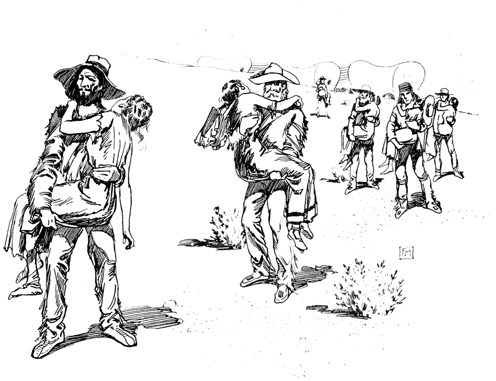
Two days at this post served to put the members of the company, as well as the cattle, in fairly good condition, and the men who had treated us so kindly urged that we take our departure without further 137 loss of time lest we be overtaken by snowstorms while among the Blue Mountains, which range it would be necessary to cross before we arrived at the Oregon country.
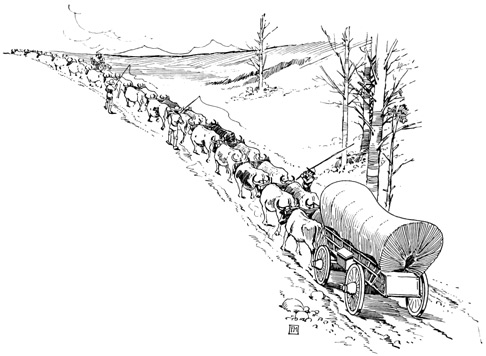
I understood that such advice was good, and when John Mitchell would have lingered despite the advice of the trappers, I took it upon myself to insist that we go forward, picturing to him in the most vivid colors the result if winter came upon us before we had scaled the mountain range.
In order that we might not overtax our newly acquired strength, we brought the first day's march from Fort Boise to an end at the bank of the Malheur River, sixteen miles distant. Next day we traveled thirty-one miles to Burnt River, where we halted one day to make ready for a sixty-mile journey to Powder River.
To make any attempt at describing this part of our journey would be repeating the words I have set down many times before. The trail was as rough as can well be imagined, and the labor of getting the heavy wagons along quite as great as had been found elsewhere.
Because of the supplies bought at Fort Boise, we did not suffer greatly from hunger, although we were allowed only a small portion of food each day; but 138 the animals were in a half-famished condition all the while until we had arrived at the Grande Ronde, which is a beautiful valley among the mountains, where grass can be found in abundance.
There in that excellent camping place we remained two days, the cattle meanwhile feeding greedily, as if realizing that it was necessary they add to their strength in order to make the journey over the mountains, fifteen miles away.
Refreshed by the long halt, we began to climb the Blue Mountains, where the trail led over such steep ascents that it became necessary to yoke all our cattle to one wagon, pull it a mile or two up what was much like a cliff, and then drive the oxen back for another load, thus winning our advance with the greatest difficulty, and after the most severe labor traveling no more than seven miles in one day. 139
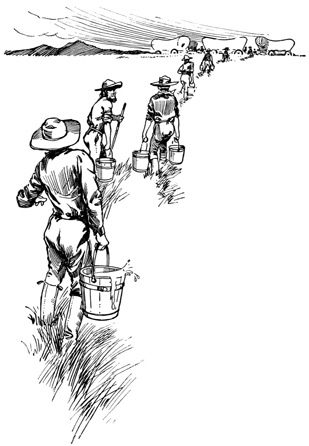
It was about the middle of September when we arrived at the Umatilla River, where is an Indian village under rule of the chief Five Crows of the Cayuse tribe, and a more friendly tribe I have never seen. They had not a little land cultivated,—of course all the work had been done by the squaws,—and stood ready to trade with us for whatever we had, but were more eager for clothing than anything else.
On leaving the valley, the trail runs straight up the bluff, over a high, grassy plain, affording fairly good footing for the animals; but when we halted that night it was necessary to carry water from the stream no less than a mile and a half up on the ridge, to our camp.
Two days later we came upon a village of the Walla Walla Indians, who, instead of begging, offered us venison and potatoes and seemed to be much pleased when we accepted their gifts; we lingered with them a day, for now the time had come when I could no longer call myself guide. 140
We had come within sight of the Columbia River, which was not more than four miles away, and farther than this I had never gone, for my father in his trading trips had generally halted in the Umatilla Valley, where he remained until having gathered a large supply of furs.

Now that the river was in full view, any of the party might have led the way, for the trail was fairly well defined; but there were so many chances of wandering out of the most direct course that I urged John Mitchell to hire one of the Walla Walla Indians to serve us until we arrived at Oregon City. 141
To my surprise he refused, but insisted that I finish the task.
It is true that I could continue as guide while we had the river near at hand to mark out the general course, and it pleased me much that he should be willing to put so much confidence in me, for I understood, or believed I did, when we left Independence, that he was more than doubtful whether a lad of my age could properly do that which might be required.
As I learned from the Indians, we had but one more difficult passage to make before the journey would be finished, and although the cattle and the horses were worn nearly to the verge of uselessness, I believed that by making slow marches, if the winter did not come upon us too suddenly, it would be possible to make our way through.
The way was hard, more difficult, it seemed to me, than any over which we had passed. But by working carefully, sparing the cattle as much as we could, and not forcing them more than an eight- or ten-mile march, we succeeded in passing over the bluff, until we came to the Des Chutes River.
At this stream it was necessary to have assistance from the Indians, because it would be impossible for so small a party as ours to make the crossing. The 142 current was so rapid and violent, besides being exceedingly deep at places, that we could not hope to take the wagons over except by using canoes as ferryboats.
This last we did, lashing upon five or six of the largest a platform of poles and split logs, until there had been formed a bed sufficiently large to give room for a wagon.
It seemed to me as if John Mitchell would never make a bargain for this rough ferrying. The Indians demanded as the price of their labor almost everything they saw in the wagons, and at least three hours were spent in haggling, before we were ready to make the first venture.
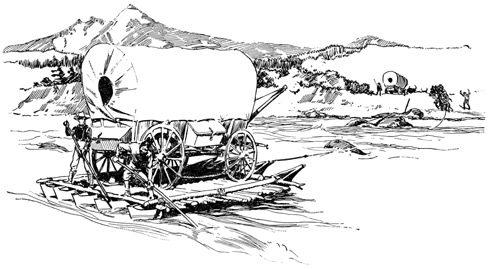
Then our picket ropes were doubled and tied together until we had a length sufficient to stretch across the stream. One end of this was made fast to the platform of logs and canoes, and the other carried by 143 a party of the Indians to the opposite side of the stream, when all the strength of every man that could be mustered was required to keep our ferryboat from striking upon the rocks.
We were two days making this passage, although the stream at its widest part is not over a hundred fifty yards, and when, finally, the task had been accomplished and we started on the last stage of our journey, it was found that, in addition to what we had given the Indians, they had succeeded in stealing a quantity of powder and shot, several shirts, and two pair of trousers, one pair of which, I grieve to say, belonged to me and were the best I ever owned.
I wish I could express the thankfulness and relief which came upon me on the 29th of September, when we arrived at the end of our journey, for then we had come to the Dalles, or the Methodist Missions, beyond which no wagon had ever passed.
At this place we found several families of would-be settlers waiting for a passage down the river in one of the two small boats which ran from Cascade Falls to Fort Vancouver, from which place they might continue the journey by water to Oregon City.
Here, at what is known as the Dalles of the Columbia, where the water rushes through a long, narrow 144 channel of rock with so swift a current that when the water is high even boats propelled by steam cannot stem it, the missionaries sent out by the Methodist Church have built a few dwellings, a schoolhouse, and a barn, besides planting the surrounding land by aid of the Indians whom they have converted from a life of savagery to the knowledge of God.
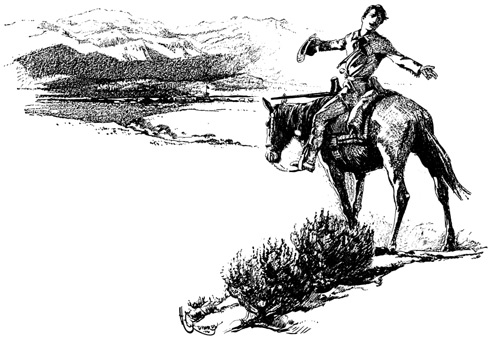
I cannot take to myself very much credit because of having led John Mitchell's company without serious mishap, even though I have twice before traversed the trail from the Missouri River. Yet we had no trouble which could not be overcome by hard labor, and every member of the company arrived at the journey's end in good health, which is more than can be said of other emigrants. 145
When we arrived at the Dalles of the Columbia, we found there emigrants who had lost more than half of all their live stock during the long journey, and again my heart was overflowing with thankfulness, because we had suffered no great loss.
On leaving Independence there were in John Mitchell's train, as I have already set down, thirty cows, forty oxen, twenty horses, and ten mules. We arrived at the Dalles with twenty-one cows, thirty-two oxen, seventeen horses, and six mules.
Here at the Dalles, as I have said, the journey was nearly ended, and here it is that I, Antoine, who now three times have crossed from the Missouri to the Columbia River, have come to an end of my story-telling.
In guiding John Mitchell's company over this long journey of more than two thousand miles, I did no more than show them what I knew of woodcraft, how to kill the buffalo, to stalk the antelope, to creep up on the elk, and, what in the Indian country is of the greatest importance, how to form camp so that they might be in least danger of a surprise.
My mother had come over this long stretch of country with fewer hardships than any other woman in the company. She had been, as you might say, 146 familiar with travel in the wilderness, for twice had she been out with my father on his trading trips, and knew how to take advantage of this time of rest, or of that period of toil.
Having left our home in St. Louis, we began to realize, as the end of the journey drew near, that we must look upon ourselves now as settlers in the Oregon country.
Because of not having sufficient money with which to embark in my father's business, I must content myself with becoming a farmer, that I might the better care for my mother. Even though it did not accord with my wishes to abandon the life of a trapper, yet that was of no account, so long as I was able to do my duty by my mother, even as she has done her duty, and more, by me.
Concerning the journey down the river, when we traveled comfortably on a boat, there is no reason why I should set down anything, save that we arrived at Oregon City on the twenty-second day of October. We remained at the Mission, with other intending settlers, a long time waiting for the boats, and when we arrived the journey which had been begun on the sixth day of May, if we counted the beginning when we left Independence, was at an end. 147
There were many matters regarding this long march of ours, many small adventures and larger misadventures, which I would dearly have loved to set down.
It would also have pleased me to tell how it was that I came to buy land on the Columbia River, with the money earned as a guide, together with what was received from the sale of the old home.
All this and more, I would like to set down in detail; but I have not the time in which to do it, therefore I will write as the last words, that I, who once claimed St. Louis as my home, while I labor with my hands in the fields for my dear mother, have put behind me the past with its lure of trapping and hunting, and learned to think of myself only as Antoine of Oregon.
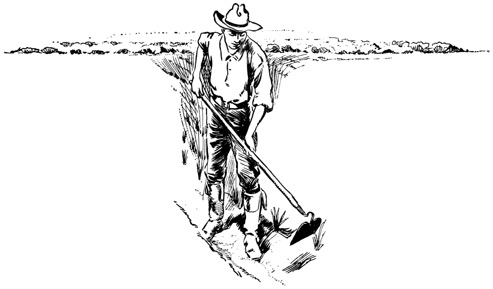
JAMES OTIS'S COLONIAL SERIES
| Calvert of Maryland | Richard of Jamestown |
| Mary of Plymouth | Ruth of Boston |
| Peter of New Amsterdam | Stephen of Philadelphia |
Price, each, 35 cents. For grades 3-5
Don't you remember the "Toby Tyler" stories, which appeared some years ago in "Harper's Young People"? And don't you remember how impatiently boys and girls looked forward to the next issue merely because of those tales? Stories like those mean something to children and make an impression.
¶ Here are six new stories by the same author, James Otis, the first he has ever written for schools. They are just as fascinating as his earlier ones. They are stories and yet they are histories. Their viewpoint is entirely original, the story of each settlement being told by one of the children living in the colony. For this reason only such incidents as a child might notice, or learn by hearsay, are introduced—but all such incidents are, as far as possible, historical facts and together they present a delightfully graphic and comprehensive description of the daily life of the early colonists.
¶ The style in which the children tell the stories reads as charmingly as that of a fairy tale, and abounds in quaint humor and in wholesome, old-fashioned philosophy.
¶ Each book is profusely illustrated with pen and ink drawings that not only add to its artistic attractiveness, but will be found a genuine aid to the child's imagination in reproducing for him realistic glimpses into a home-life of long ago.
¶ There is no better way for your pupils to learn about the beginning of our country. The books are just as well suited to libraries and home use. Write us about them.
AMERICAN BOOK COMPANY
HISTORICAL READERS
By H. A. GUERBER
| Story of the Thirteen Colonies | $0.65 |
| Story of the Great Republic | .65 |
| Story of the English | .65 |
| Story of Old France | .65 |
| Story of Modern France | .65 |
| Story of the Chosen People | .60 |
| Story of the Greeks | .60 |
| Story of the Romans | .60 |
Although these popular books are intended primarily for supplementary reading, they will be found quite as valuable in adding life and interest to the formal study of history. Beginning with the fifth school year, they can be used with profit in any of the upper grammar grades.
¶ In these volumes the history of some of the world's peoples has taken the form of stories in which the principal events are centered about the lives of great men of all times. Throughout the attempt has been made to give in simple, forceful language an authentic account of famous deeds, and to present a stirring and lifelike picture of life and customs. Strictly military and political history have never been emphasized.
¶ No pains has been spared to interest boys and girls, to impart useful information, and to provide valuable lessons of patriotism, truthfulness, courage, patience, honesty, and industry, which will make them good men and women. Many incidents and anecdotes, not included in larger works, are interspersed among the stories, because they are so frequently used in art and literature that familiarity with them is indispensable. The illustrations are unusually good.
¶ The author's Myths of Greece and Rome, Myths of Northern Lands, and Legends of the Middle Ages, each, price $1.50, present a fascinating account of those wonderful legends and tales of mythology which should be known to everyone. Seventh and eighth year pupils will delight in them.
AMERICAN BOOK COMPANY
CARPENTER'S READERS
By FRANK G. CARPENTER
GEOGRAPHICAL READERS
| North America | $0.60 | Africa | $0.60 |
| South America | .60 | Australia, Our Colonies, and Other Islands of the Sea |
.60 |
| Europe | .70 | ||
| Asia | .60 |
READERS ON COMMERCE AND INDUSTRY
| How the World is Fed $0.60 | How the World is Clothed, $0.60 | ||
| How the World is Housed, $0.60 | |||
Carpenter's Geographical Readers supplement the regular textbooks on the subject, giving life and interest to the study. They are intensely absorbing, being written by the author on the spots described, and presenting accurate pen-pictures of places and peoples. The style is simple and easy, and throughout each volume there runs a strong personal note which makes the reader feel that he is actually seeing everything with his own eyes.
¶ The books give a good idea of the various peoples, their strange customs and ways of living, and to some extent of their economic conditions. At the same time, there are included graphic descriptions of the curious animals, rare birds, wonderful physical features, natural resources, and great industries of each country. The illustrations for the most part are reproductions of photographs taken by the author. The maps show the route taken over each continent.
¶ The Readers on Commerce and Industry take up the three great essentials of human existence, food, clothing, and shelter. The children visit the great food centers and see for themselves how the chief food staples are produced and prepared for use, they travel over the globe investigating the sources of their clothing, and they learn how the different races are housed, and of what their dwellings are composed. The journeys are along geographical lines.
AMERICAN BOOK COMPANY
UNITED STATES HISTORIES
By JOHN BACH McMASTER, Professor of American
History, University of Pennsylvania
Primary History $0.60 School History $1.00 Brief History $1.00
These standard histories are remarkable for their freshness and vigor, their authoritative statements, and their impartial treatment. They give a well-proportioned and interesting narrative of the chief events in our history, and are not loaded down with extended and unnecessary bibliographies. The illustrations are historically authentic, and show, besides well-known scenes and incidents, the implements and dress characteristic of the various periods. The maps are clear and full, and well executed.
¶ The PRIMARY HISTORY is simply and interestingly written, with no long or involved sentences. Although brief, it touches upon all matters of real importance to schools in the founding and building of our country, but copies beyond the understanding of children are omitted. The summaries at the end of the chapters, besides serving to emphasize the chief events, are valuable for review.
¶ In the SCHOOL HISTORY by far the larger part of the book has been devoted to the history of the United States since 1783. From the beginning the attention of the student is directed to causes and results rather than to isolated events. Special prominence is given to the social and economic development of the country.
¶ In the BRIEF HISTORY nearly one-half the book is devoted to the colonial period. The text proper, while brief, is complete in itself; and footnotes in smaller type permit of a more comprehensive course if desired. Short summaries, and suggestions for collateral reading, are provided.
AMERICAN BOOK COMPANY
PUPILS' OUTLINE STUDIES IN UNITED STATES HISTORY
$0.30
By FRANCIS H. WHITE, A.M., Professor of History and Political Science, Kansas State Agricultural College
A blank book, which is intended for the pupil's use in connection with any good history of the United States.
It presents an original combination of devices conveniently arranged, and affords an unusually clear idea of our country's history in which the chief events are deeply impressed on the learner's mind. The entire development of the United States has been taken up in the most logical manner, and facts of a similar nature have been grouped naturally together.
¶ This material is in the form of outline maps, charts, tables, outlines for essays, book references, etc., with full directions for the pupil, and suggestions to the teacher. Students are required to locate places, trace routes, follow lines of development, make pictures of objects illustrating civilization, write compositions, etc.
¶ The use of this book has demonstrated that the teaching of history need no longer present any difficulties to the teacher. Mere memorizing is discouraged, and the pupil is compelled to observe closely, to select essential facts, to classify his knowledge, to form opinions for himself, and to consult the leading authorities. The interest thus instilled will invariably lead to a sufficient grasp of the subject.
¶ The body of the book is divided into the following general headings: The Indians; Discovery and Exploration; Colonization; The Development of Nationality; Military History; The Progress of Civilization; Political History; and Our Flag and Its Defenders. While none of these periods is treated exhaustively, each is taken up so comprehensively and suggestively that further work can be made easily possible where more time is available.
AMERICAN BOOK COMPANY
NEW SERIES OF THE
NATURAL GEOGRAPHIES
REDWAY AND HINMAN
TWO BOOK OR FOUR BOOK EDITION
| Introductory Geography | $0.60 | School Geography | $1.25 |
| In two parts, each | .40 | In two parts, each | .75 |
In the new series of these sterling geographies emphasis is laid on industrial, commercial, and political geography, with just enough physiography to bring out the causal relations.
¶ The text is clear, simple, interesting, and explicit. The pictures are distinguished for their aptness and perfect illustrative character. Two sets of maps are provided, one for reference, and the other for study, the latter having corresponding maps drawn to the same scale.
¶ The INTRODUCTORY GEOGRAPHY develops the subject in accordance with the child's comprehension, each lesson paving the way for the next. In the treatment of the United States the physiographic, historical, political, industrial, and commercial conditions are taken up in their respective order, the chief industries and the localities devoted largely to each receiving more than usual consideration. The country is regarded as being divided into five industrial sections.
¶ In the SCHOOL GEOGRAPHY a special feature is the presentation of the basal principles of physical and general geography in simple, untechnical language, arranged in numbered paragraphs. In subsequent pages constant reference is made to these principles, but in each case accompanied by the paragraph number. This greatly simplifies the work, and makes it possible to take up the formal study of these introductory lessons after the remainder of the book has been completed. With a view to enriching the course, numerous specific references are given to selected geographical reading.
AMERICAN BOOK COMPANY
STEPS IN ENGLISH
By A. C. McLEAN, A.M., Principal of Luckey School, Pittsburg; THOMAS C. BLAISDELL, A.M., Professor of English, Fifth Avenue Normal High School, Pittsburg; and JOHN MORROW, Superintendent of Schools, Allegheny, Pa.
| Book One. | For third, fourth, and fifth years | $0.40 |
| Book Two. | For sixth, seventh, and eighth years | .60 |
This series presents a new method of teaching language which is in marked contrast with the antiquated systems in vogue a generation ago. The books meet modern conditions in every respect, and teach the child how to express his thoughts in language rather than furnish an undue amount of grammar and rules.
¶ From the start the attempt has been made to base the work on subjects in which the child is genuinely interested. Lessons in writing language are employed simultaneously with those in conversation, while picture-study, the study of literary selections, and letter-writing are presented at frequent intervals. The lessons are of a proper length, well arranged, and well graded. The books mark out the daily work for the teacher in a clearly defined manner by telling him what to do, and when to do it. Many unique mechanical devices, e.g., a labor-saving method of correcting papers, a graphic system of diagramming, etc., form a valuable feature of the work.
¶ These books are unlike any other series now on the market. They do not shoot over the heads of the pupils, nor do they show a marked effort in writing down to the supposed level of young minds. They do not contain too much technical grammar, nor are they filled with what is sentimental and meaningless. No exaggerated attention is given to analyzing by diagramming, and to exceptions to ordinary rules, which have proved so unsatisfactory.
AMERICAN BOOK COMPANY
WEBSTER'S DICTIONARIES
The Only Genuine School Editions
These Dictionaries are the acknowledged authority throughout the English speaking world, and constitute a complete and carefully graded series. The spelling and punctuation in all leading schoolbooks are based on them.
| WEBSTER'S PRIMARY SCHOOL DICTIONARY | $0.48 | |
| Containing over 20,000 words and meanings, with over 400 illustrations. | ||
| WEBSTER'S COMMON SCHOOL DICTIONARY | $0.72 | |
| Containing over 25,000 words and meanings, with over 500 illustrations. | ||
| WEBSTER'S HIGH SCHOOL DICTIONARY, | $0.98 | |
| Containing about 37,000 words and definitions, and an appendix giving a pronouncing vocabulary of Biblical, Classical, Mythological, Historical, and Geographical proper names, with over 800 illustrations. | ||
| WEBSTER'S ACADEMIC DICTIONARY | ||
| Cloth, $1.50; Indexed | $1.80 | |
| Half Calf, $2.75; Indexed | 3.00 | |
| Abridged directly from the International Dictionary, and giving the orthography, pronunciations, definitions, and synonyms of about 60,000 words in common use, with an appendix containing various useful tables, with over 800 illustrations. | ||
| SPECIAL EDITIONS | ||
| Webster's Countinghouse Dictionary. Sheep, Indexed | $2.40 | |
| Webster's Handy Dictionary | .15 | |
| Webster's Pocket Dictionary | .57 | |
| The same. Roan, Flexible | ||
| The same. Roan, Tucks | .78 | |
| The same. Morocco, Indexed | .90 | |
AMERICAN BOOK COMPANY
DAVISON'S HEALTH SERIES
By ALVIN DAVISON, M.S., A.M., Ph.D., Professor of
Biology in Lafayette College.
| Human Body and Health: | |||
| Elementary, $0.40 | Intermediate, $0.50 | Advanced, $0.80 | |
| Health Lessons: | |||
| Book One, $0.35 | Book Two, $0.60 | ||
The object of these books is to promote health and prevent disease; and at the same time to do it in such a way as will appeal to the interest of boys and girls, and fix in their minds the essentials of right living. They are books of real service, which teach mainly the lessons of healthful, sanitary living, and the prevention of disease, which do not waste time on the names of bones and organs, which furnish information that everyone ought to know, and which are both practical in their application and interesting in their presentation.
¶ These books make clear:
¶ That the teaching of physiology in our schools can be made more vital and serviceable to humanity.
¶ That anatomy and physiology are of little value to young people, unless they help them to practice in their daily lives the teachings of hygiene and sanitation.
¶ That both personal and public health can be improved by teaching certain basal truths, thus decreasing the death rate, now so large from a general ignorance of common diseases.
¶ That such instruction should show how these diseases, colds, pneumonia, tuberculosis, typhoid fever, diphtheria, and malaria are contracted and how they can be prevented.
¶ That the foundation for much of the illness in later life is laid by the boy and girl during school years, and that instruction which helps the pupils to understand the care of the body, and the true value of fresh air, proper food, exercise, and cleanliness, will add much to the wealth of a nation and the happiness of its people.
AMERICAN BOOK COMPANY